【Knowledge Points】
1. Introduction to the author
Cen Shen (approximately 715—770), a famous frontier poet in the Tang Dynasty, was as famous as Gao Shi. At that time, there were frequent wars in the northwest frontier area. With the ambition to make contributions outside the Great Wall, Cen Shen went out twice to the frontier army for a long time and lived in the frontier army for six years. Observation and deep experience. Cen Shen's poems are rich in imagination, novel in artistic conception, majestic in momentum, strange in style, magnificent in poetry, and have romantic characteristics.
Xin Qiji (1140-1207), courtesy name You'an, nicknamed Jiaxuan, a famous poet in the Southern Song Dynasty, a representative of the unrestrained school, in the history of literature, he Together with Su Shi, it is called "Su Xin", and with Li Qingzhao, it is called "Jinan Er'an". There are more than 600 extant poems by Xin Qiji. Strong patriotism and fighting spirit are the basic ideological content of his words. He is a great unrestrained poet in Chinese history.
Second, story background
"Fifteen Military Conquests" is selected from "Yuefu Poetry Collection" Volume 25 (Zhonghua Book Company 1979 edition). The title was added later. "Fifteen Military Expeditions" is a Han Dynasty Yuefu folk song that exposes the unreasonable military service system in the feudal society. It reflects the injustice and pain of the working people under the dark military service system at that time. The complicated military service at that time made that era full of the sadness and helplessness of the little people.
"Bai Xuege Sending Judge Wu Returns to Beijing" is selected from "Cen Canji Annotation" (Shanghai Ancient Books Publishing House, 1981 edition), it is a famous song frontier poetry. In the thirteenth year of Tang Tianbao (754), Cen Shen went out of the fortress for the second time, and served as the judge of the North Court of Anxi (a civil official who assisted the local governor in the Tang Dynasty), and lived in the Luntai Shogunate. In the autumn of the fourteenth year of Tianbao, his friend Judge Wu returned In Chang'an, the capital city, the poet wrote this poem to see him off.
"Nanxiangzi Dengjingkou Beiguting Youhuai" is selected from Volume 5 of "Jiaxuan Ci Chronicle Notes" (Shanghai Ancient Books Publishing House 2007 edition). At the end of June in 1203 (the third year of Emperor Ningzong of Song Dynasty), Xin Qiji was reassigned to Zhenjiang as the prefect shortly after he was appointed as the magistrate of Shaoxing and the pacifier of eastern Zhejiang, that is, in March of the following year. Zhenjiang, which used to be a place where heroes used force and made contributions in history, has now become the second line of defense against the Jinren. When he visited the Beigu Pavilion in Jingkou (that is, Zhenjiang), he was very moved by the scenery. It is against this background that this poem was written.
3. Understand the meaning of words
Fifteen Conquest
Original text: Conquer the army at fifteen, return at eighty. Dao met a native of the village: "Who is there in the family?" The atrium gives birth to Lugu, and Inoue gives birth to Lukui. Chonggu is used for cooking, and sunflower is picked for soup. The rice soup is cooked for a while, but I don't know who it is. I went out and looked east, and my clothes were stained with tears.
Comments
A: prefix, used in front of certain titles or pronouns.
Tiny: many looks. Here it is described that there are many graves.
Dog sinus: A hole in the wall for dogs to enter and exit. The hares come and go, implying that the homeland has long been deserted.
pheasant: pheasant.
Lugu: wild millet. Brigade, plants grow without being sown.
Well: This refers to the well platform.
Lvkui: wild vegetables. Sunflower, a vegetable.
Grain pounding: Pound the grain with a pestle and mortar to remove the hull.
Hold: Take.
Soup: This refers to vegetable soup.
A moment: a while.
Ye: Same as "Yi", give it away.
Translation: I was enlisted to join the army at the age of fifteen, and I was discharged back to my hometown at the age of eighty. I met a villager on the road and asked: "Who else is there in my family?" "Looking at your place from a distance, it is now a tomb among the pine and cypress forests." Walking to the door of the house, I saw hares coming in and out of the dog hole. , The pheasants are flying around on the roof. Wild millet grows in the yard, and wild sunflowers surround the well platform. Use a pestle and mortar to remove the husk of the wild valley for cooking, and pick off the sunflower leaves to make vegetables. The dishes and rice were ready in a while, but I didn't know who to give them to. Walking out of the gate and looking towards the east, old tears spilled on Zhengyi.
Bai Xuege sends Judge Wu back to Beijing
Original text:The north wind blows the ground and the white grass breaks, and Hu Tian is snowing in August. Suddenly, like a spring breeze overnight, thousands of trees and pear trees bloom. Scattered into the bead curtain and wet Luo curtain, the fox fur is not warm, and the brocade quilt is thin. The general can't control his horn bow, and the iron coat of the general's guard is hard to wear. The vast sea is surrounded by hundreds of feet of ice, and the gloomy clouds are gloomy. The Chinese army buys wine and drinks for returning guests, Huqin, lute and Qiangdi. Dusk snow falls down the gate one after another, and the red flag is frozen by the wind and cannot be turned over. The east gate of Luntai saw you off, and the Tianshan Road was covered with snow. You can't see you when you turn around the mountain circuit, and stay in the horse riding place above the snow.
Comments
White Grass: A kind of pasture produced in the Western Regions, which turns white when it dries up.
Hu Tian: This refers to the sky in the north of the Great Wall.
Bead curtain: a curtain made of pearls. Like the following "Luomu (tent made of silk)", it is a beautifying term.
The brocade quilt is thin: the brocade quilt looks thin.
Hornbow: A bow decorated with animal horns.
Control: pull away.
Guardian: The chief guard of the frontier in the Tang Dynasty.
Attire: wear.
Hanhai: refers to the desert.
The railing: a criss-cross pattern.
Bleak: Dark.
Central Army: The camp of the commander.
Drink: banquet.
Huqin: generally refers to the Qin of the Western Regions.
Yuanmen: The camp gate of the leading general.
Pull: pull, pull.
Flip: flutter.
Translation: The north wind sweeps across the earth and breaks the white grass, and snow falls in the sky in the northern part of the country in August. Suddenly, it was like a spring breeze blowing overnight, like thousands of pear trees blooming. Snowflakes scattered into the bead curtains and wet the curtains, the fox fur was not warm enough to wear, and the brocade quilt also looked thin. The general's gauntlets were too cold to draw his bow, and his iron armor was too cold to wear. The desert is criss-crossed by hundreds of feet of ice, and the sky is filled with dark and melancholy clouds. In the general manager's tent, wine is placed as a farewell party for returning guests, and the Huqin, lute and Qiangdi ensemble is used to entertain the guests. In the evening, heavy snow fell in front of the gate, and the wind pulled the red flag, which was frozen and unable to flutter. Outside the east gate of Luntai I will see you off to Beijing. When you left, the Tianshan Road was covered with heavy snow. You can no longer be seen on the twists and turns of the mountain road, leaving only a line of horseshoe marks on the snow.
Nanxiangzi Dengjingkou Beiguting Youhuai
Original text:Where to look at China? Beigu Building is full of scenery. How many things have risen and fallen through the ages? long. The Yangtze River flows endlessly. A young man with ten thousand pockets, the battle in the southeast has not stopped.
Comments
Shenzhou: Central Plains area.
Young and Wandouhou: Refers to Sun Quan commanding thousands of troops when he was young. Douhou, the helmet worn by soldiers in ancient battles. This refers to soldiers.
Sit down: occupy, occupy.
Adversary: An opponent with comparable abilities.
Cao Liu: Refers to Cao Cao and Liu Bei.
Being a child should be like Sun Zhongmou: Cao Cao led his army to the south, and when he saw Sun Quan's army's military appearance, he sighed: "Being a child should be like Sun Zhongmou."
Translation: Where can I see the Central Plains? Upstairs in Beigu Building, there are beautiful scenery everywhere. From ancient times to the present, how many major events have occurred in the rise and fall of countries? I don't know, it's too old. Only the water of the Yangtze River flows eastward, never ending. When Sun Quan was young, he commanded thousands of troops, occupied the southeast, persisted in the war of resistance, and never bowed his head or surrendered to the enemy. Who is Sun Quan's opponent among the heroes of the world? Only Cao Cao and Liu Bei. It is no wonder that Cao Cao said: "Being a child should be like Sun Zhongmou."
Fourth, problem induction
Fifteen Conquest
1. How to understand the verse "Conquer the army at fifteen and return at eighty"?
Compared with "fifteen" and "eighty", exaggerated rhetorical techniques are used to highlight the length of time that veterans have "conscripted in the army"; "Return" echoes "conscript to the army", indicating that he has not been able to return halfway, highlighting the heavy military service. The word "beginning" also shows that I have been looking forward to home for a long time.
2. "Who is there in the family?" Why does the protagonist ask like this?
A question of "who is there at home" launched the focal point of the work - home. After sixty-five years, how dare you expect your family members to be safe and your loved ones alive? It is a blessing in misfortune to have one or two survivors. So he just asked, who else in the family is lucky enough to survive?
3. What did the veteran see when he returned home, and what does this reveal?
Hares scurried in and out of dog holes, pheasants fluttered up the beams of houses, wild millet grew all over the courtyard, wild sunflowers covered the edge of the well, eyes full The desolate and desolate scene reveals the cruel disaster of war in the feudal society and the pain of the people being enslaved by the ruler.
Bai Xuege sends Judge Wu back to Beijing
1. The first two sentences describe the climate characteristics of the frontier fortress?
Describes the climate characteristics of frontier fortress wind and snow. In contrast, winter comes very early, which is unavoidable. The character "Fei" outlines the scene of snowflakes dancing in the sky.
2. "Suddenly, like a spring breeze overnight, thousands of trees and pear blossoms bloom." Why have these two lines of poetry become famous lines through the ages?
These two poems use metaphorical rhetorical techniques. The north wind is regarded as the spring breeze, and the snowflakes are compared to the pear blossoms. It is novel and appropriate, and the association is wonderful. It shows a magnificent picture of the ice and snow scenery of the Northland, and creates an interesting, magnificent and romantic artistic conception. It shows the poet's optimistic feelings of turning suffering into joy and being positive.
3. "Scattered into the bead curtain and wet the curtain, the fox fur is not warm and the brocade quilt is thin. The general's horn bow cannot be controlled, and the guard's iron clothes are cold Let’s go.” How do these four lines describe the living conditions of the frontier fighters?
Describing the bitter cold living conditions of the frontier soldiers, the sentence "scattered into" inherits the above-mentioned wild snow scene, and the strokes are transferred from outside the account to inside the account, Writing about the life in the army in the extremely cold and snowy days outside the Great Wall, the last two sentences are intertextual, which sets off the bitter cold of the frontier fortress from the side.
4. "The vast sea is surrounded by hundreds of feet of ice, and the clouds are bleak and gloomy." What role do these two lines play in the whole poem?
These two sentences are transitional sentences, turning the attention to "external scene", "baizhangbing" is an exaggeration, "gloomy" is The farewell creates an atmosphere of "sorrow". Here, the barracks of the frontier soldiers are placed in a vast and vast background, which gives people a strange and magnificent feeling. At the same time, the transition from singing snow to farewell creates an atmosphere for the farewell scene.
5. Please develop a reasonable imagination and describe the picture shown by "the snow falls to the gate at dusk, and the red flag is frozen by the wind".
The returnee stepped out of the tent in the twilight against the heavy snow, and the brightly colored flags frozen in the air looked gorgeous in the white snow. The flag is unshakable and unyielding in the cold wind, just like a border guard.
6. "You can't see the king when you turn around the mountain circuit, and you can stay where the horses are walking in the sky above the snow." What kind of feelings does the poet express in these two lines?
Expresses the poet's farewell and infinite melancholy towards his friends. The blending of scenes makes people have endless reverie, lingering thoughts and endless aftertaste.
Nanxiangzi Dengjingkou Beiguting Youhuai
1. Why do you say "Where can I look at China? The Beigu Building is full of scenery." Is it a question without an answer? Why did the poet ask this?
These two sentences are inverted sentences, and they should be "Beigulou is full of scenery, where can I look at Shenzhou?" The reason why the poet asked himself did not answer , is to express the grief and indignation at this time. Thinking that the great Central Plains has fallen into the hands of the Jinren, I asked this question because of the situation.
2. Analyze the expression effect of "How many things have risen and fallen through the ages? Yoyo. Endless Yangtze River rolling".
From the perspective of time and space, the poets have a deep sense of history. The two repeated words "yoyo" and "rolling" aggravate the emotional color and enhance the charm. At the same time, the word "youyou" refers to both the long time and the endless thoughts of the poet.
5. Text theme
"Fifteen Military Expeditions" depicts various scenes of a veteran who has fought abroad on his way back to his hometown and after arriving home, revealing the feudal military service system. The suffering caused by the people expresses the poet's resentment and sympathy for the suffering caused by the feudal military service system to the working people.
The poem "Bai Xuege Sending Judge Wu Returns to Beijing" depicts the beautiful scenery of the ice and snow outside the Great Wall, and expresses the poet's love and praise for the scenery of the Frontier Fortress , and the reluctance to part with friends and the melancholy of parting.
The lyricists of "Nanxiangzi Dengjingkou Beiguting Youhuai" satirized the imperial court and hinted euphemistically through the praise of ancient heroes. He expressed his dissatisfaction with the imperial court, and at the same time expressed his patriotic pride.
【Knowledge Points】
1. Introduction to the author
Wen Tianxiang (1236—1283), born in Luling, Jizhou (now Ji’an, Jiangxi), a politician and writer in the Southern Song Dynasty, a famous official who resisted the Yuan Dynasty, and a nationalist Hero, together with Lu Xiufu and Zhang Shijie, is called "Three Heroes in the Late Song Dynasty".
Zhang Yanghao (1270—1329), a native of Jinan (now Shandong), was a famous statesman and writer in the Yuan Dynasty. Together with Yuan Mingshan of Qinghe and Cao Yuanyong of Wenshang, they are called "Three Jun". Representative works include "Three Things Advice", Sanqu "Shanpo Yang·Tong Caring for the Ancient" and so on.
2. Background of the story
"Crossing Ling Ding Yang" was dated in 1279 (the second year of Song Xiangxing). In 1278 (the first year of Song Xiangxing), Wen Tianxiang was defeated and captured at Wupoling. In the first month of the second year, the fleet that imprisoned Wen Tianxiang passed through Lingdingyang and forced Zhang Hongfan to write a letter to recruit Zhang Shijie who persisted in resisting at sea. Wen Tianxiang refused. , show this poem to show your ambition.
"Shanpo Yang·Tong Caring Ancient" In the second year of the calendar (1329), there was a severe drought in Shaanxi, and Zhang Yanghao was recruited to serve as the prime minister of Shanxi Xingtai to provide relief Disaster victims, on his way to Shaanxi, witnessed the people's serious disasters, felt indignant, so he scattered all his family wealth, tried his best to rescue the disaster, and finally died of overwork. This Sanqu was composed when he passed Tongguan on the way to his post.
Third, understand poetry
Crossing Ling Dingyang
Original text: After a hard encounter, there are few stars around. The mountains and rivers are broken and the wind is blowing, and the life experience is ups and downs and the rain beats the flats. Anxious beachheads say fear, and sigh alone in the ocean. Since ancient times, who has never died? Keep the loyal heart to reflect the history.
Comments:
Encounter: refers to meeting the selection of the imperial court.
From one scripture to another: Refers to being proficient in a certain scripture and passing the imperial examination to obtain an official. Wen Tianxiang ranked first in Jinshi in the fourth year of Song Lizong Baoyou (1256).
Gange: Gange and Ge are two kinds of weapons, which refer to war here.
Little: deserted. It refers to the Song Dynasty's Anti-Yuan War gradually subsided.
Four weeks: 4th anniversary.
Wind catkins: Describe the power of the Song Dynasty as catkins in the wind, losing its foundation and about to collapse.
Yu Daping: It is a metaphor for one's own life experience, like duckweed in the rain, drifting without roots, rising and sinking from time to time.
Fearful Beach: In the Ganjiang River in Wan'an, Jiangxi today, the current is fast and extremely dangerous.
Lonely: The appearance of being alone.
History: In ancient times, when writing on bamboo slips, the bamboo slices were first roasted to prevent insects from eating. Because the water in the bamboo slices evaporates like sweat, it is called "history". This refers to the history books.
Translation: The hardships of my life all began with a Confucian classic. Since I led the rebel army to fight against the Yuan soldiers, it has gone through four full years Hard times. The broken mountains and rivers of the motherland are like catkins blown by the wind, and the turmoil of their own lives is like duckweed hit by the rain. Talk about the panic in your heart on the panic beach, and lament that you are alone and helpless in Lingdingyang. Since ancient times, who can not die? Leave a sincere heart to shine on the annals of history.
Shanpo Yang·Tong Caring Ancient
Original text:The peaks and ridges are like clusters, the waves are like anger, and the mountains and rivers are outside and inside Tongguan Road. Looking at the western capital, he hesitated. Sadly, where the Qin and Han scriptures traveled, thousands of palaces and palaces have been made of earth. Prosperity, the people suffer; death, the people suffer.
Comments
Mountain: refers to Mount Hua.
River: Refers to the Yellow River.
Xidu: Refers to Chang'an.
Hesitating: Hesitating. Describe the ups and downs here.
Qin and Han passages: the ruins of Qin and Han palaces seen on the way. Both Xianyang, the capital of the Qin Dynasty, and Chang'an, the capital of the Western Han Dynasty, are to the west of Tongguan. Where you go, where you pass.
Translation: (Huashan's) peaks converge from all directions, (Yellow River's) waves are like anger, there is the Yellow River outside Tongguan, and Huashan Mountain inside, The terrain is dangerous. Looking at Chang'an in the distance, my heart is full of emotions. Passing by the ruins of the palaces of the Qin and Han Dynasties, it caused infinite sadness. Thousands of palaces have already turned into dust. Once the dynasty prospers, the people suffer; when the dynasty falls, the people still suffer.
Fourth, problem induction
Crossing Ling Dingyang
1. The first couplet describes two major events in Wen Tianxiang's life. Please summarize them in your own words.
The first sentence writes that the poet entered the official career because of the imperial examination;
2. Please give a brief appreciation of the couplets.
These two lines of poems use neat duality and vivid metaphors, comparing the perilous national situation to the catkins in the wind, and the rough life experience to the rain Duckweed connects the country's ruin with personal misfortune, and vividly shows the precarious political situation at that time.
3. What rhetorical techniques are used in the neck couplet and what is its effect?
The first sentence recalls the defeat of the army and worries about national affairs, and the next sentence describes the situation of being captured unfortunately, using duality and puns, and clever use of place names. It vividly renders the poet's fear of yesterday and the feeling of loneliness in front of him, and writes about the danger of the situation and the urgency of the situation.
4. The end couplet is a famous sentence passed down through the ages, which expresses the poet's thoughts and feelings?
The first sentence uses the rhetorical technique of rhetorical question, and the latter sentence expresses the heart directly, closing the whole article with majestic momentum and high-pitched spirit, showing the The poet's thoughts and feelings of sacrificing his life for his country and seeing death as home.
Shanpo Yang·Tong Caring Ancient
1. Please appreciate the expressive effects of the words "ju" and "anger".
This question uses the method of refining and analyzing ancient poems. From a visual point of view, the word "Ju" not only expresses the dangerous terrain of Tongguan surrounded by mountains, but also endows the mountains with life and will, which guard Tongguan. The word "nu" anthropomorphizes the Yellow River, which not only expresses the momentum of the Yellow River's roar, but also explains Tongguan's dangerous position on the bank of the Yellow River.
2. What is the role of "Tongguan Road" in the structure?
"Tongguan Road inside and outside the mountains and rivers" is a further summary of the first two sentences and also echoes the title.
3. Why does the author hesitate?
"Hesitation" because Chang'an has been dilapidated, and the dilapidated Chang'an embodies a lot of blood and sweat of the working people. "Gongque Wanjian" seems to be written in fact, but it is actually written in fiction. It summarizes the rise and fall of the Qin and Han dynasties, and does not directly mention the war.
4. How to understand the profound connotation of "prosperity, people suffer; death, people suffer"?
Here is the finishing touch of the whole song. Frequently, the people suffer. The author points out that the rise and fall of dynasties in the past brought disasters and misery to the people. This is the author's summary and judgment on the ups and downs of past history, and shows the author's deep sympathy for the suffering of the people.
5. Text theme
"Crossing Ling Ding Yang" expresses the poet's pain of worrying about the country and his willingness to sacrifice his life for the country by reminiscing his own hardships in resisting the Yuan Dynasty. Pride and ambition.
The song "Hillside Sheep·Tongguan Ancient" expresses the author's love for history by describing the dangerous terrain of Tongguan and expressing his emotions about the rise and fall of dynasties in the past. Thoughts and compassion for the people.
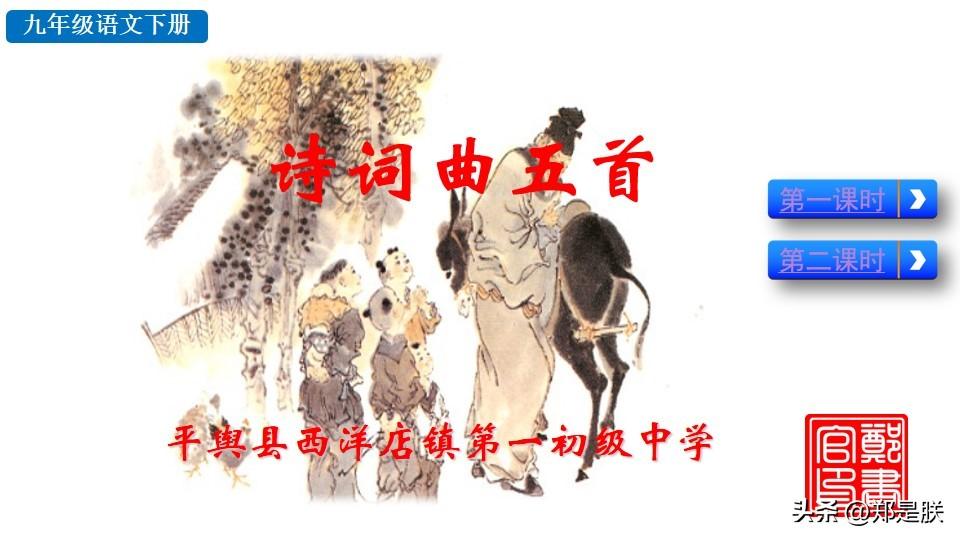

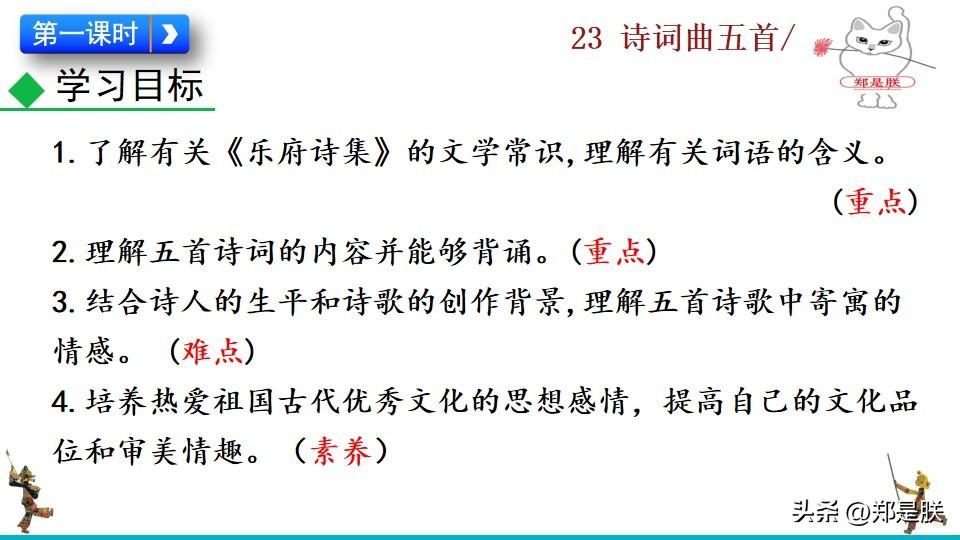
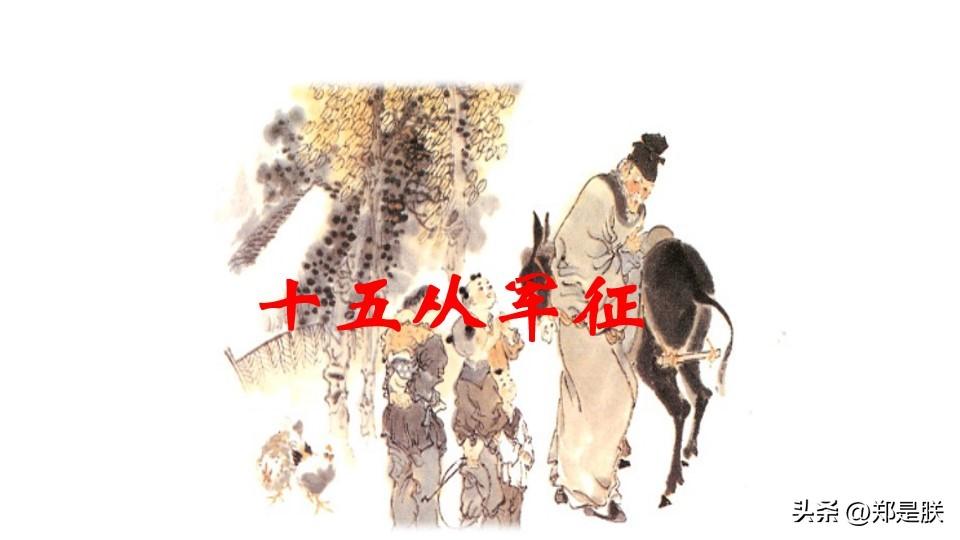
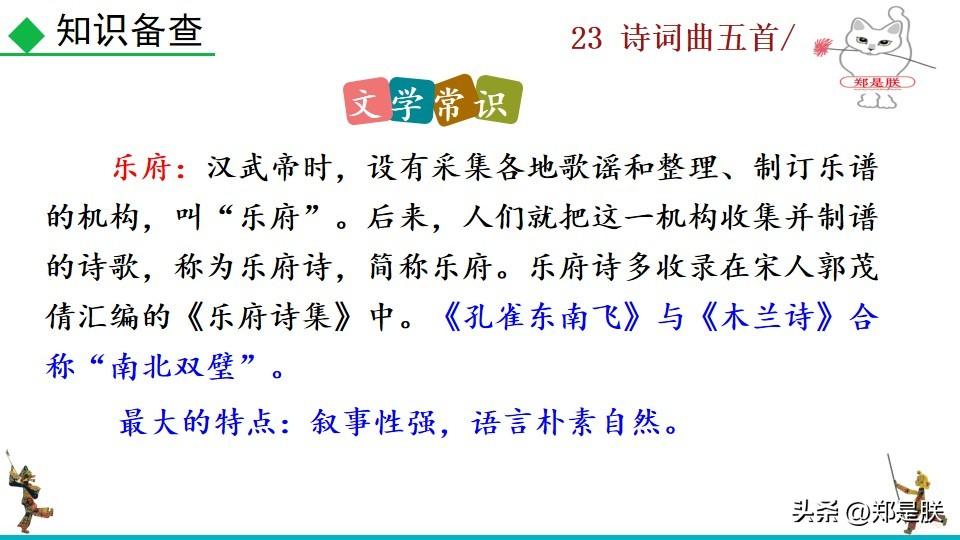
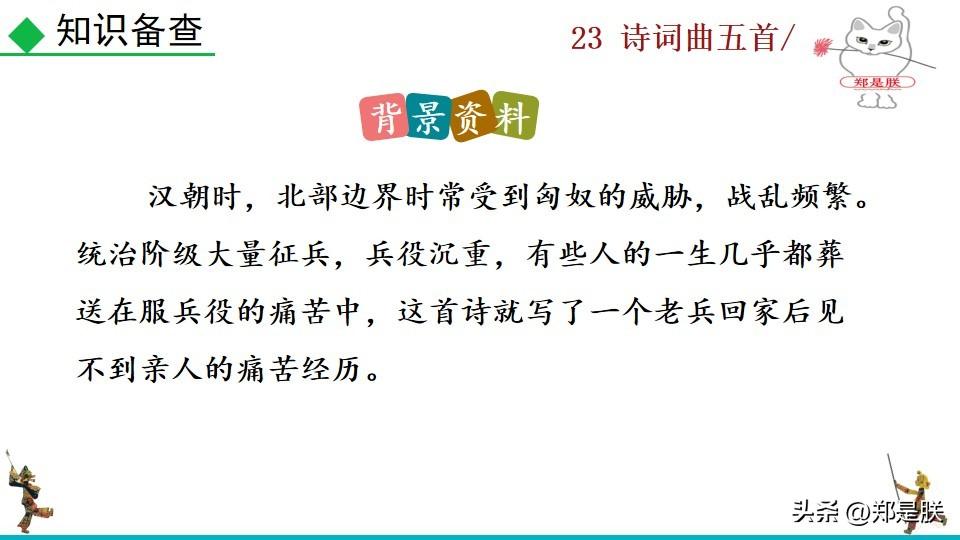
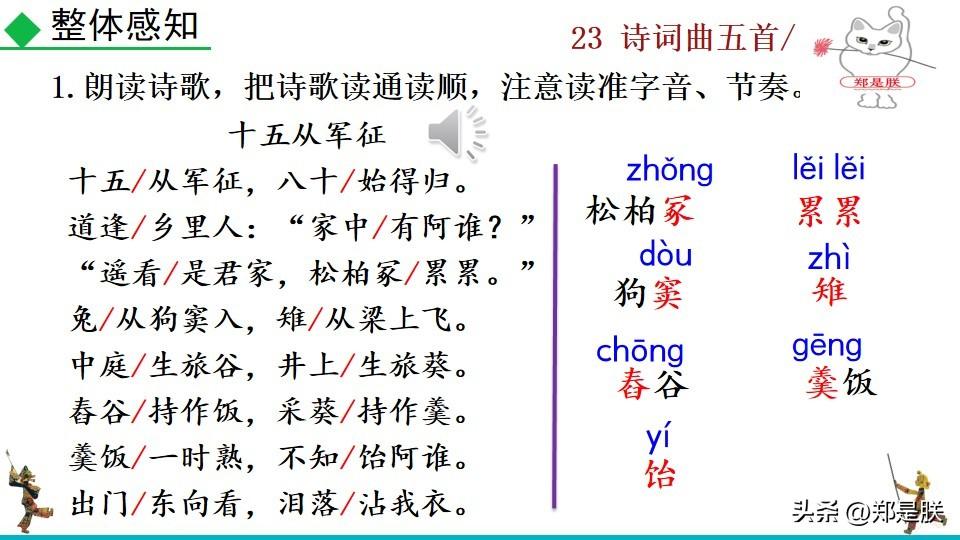
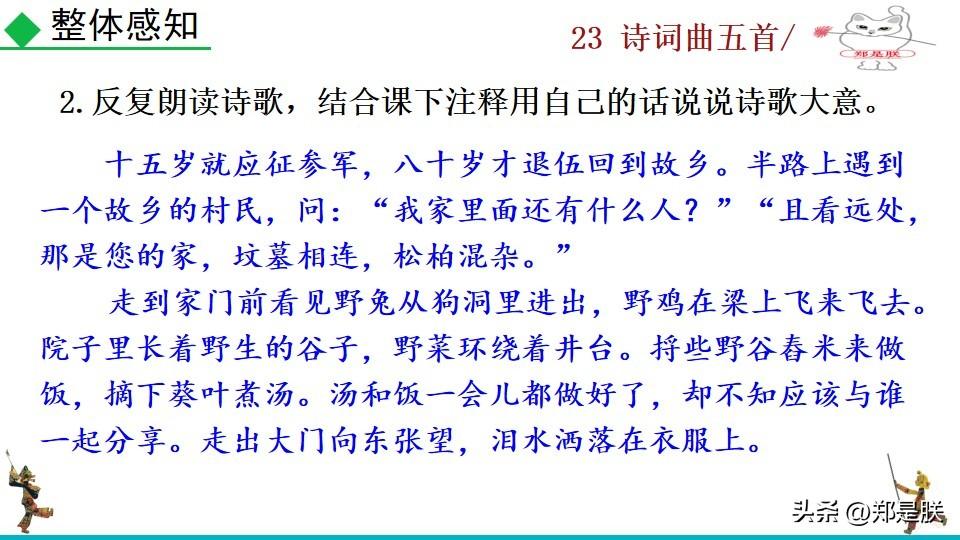
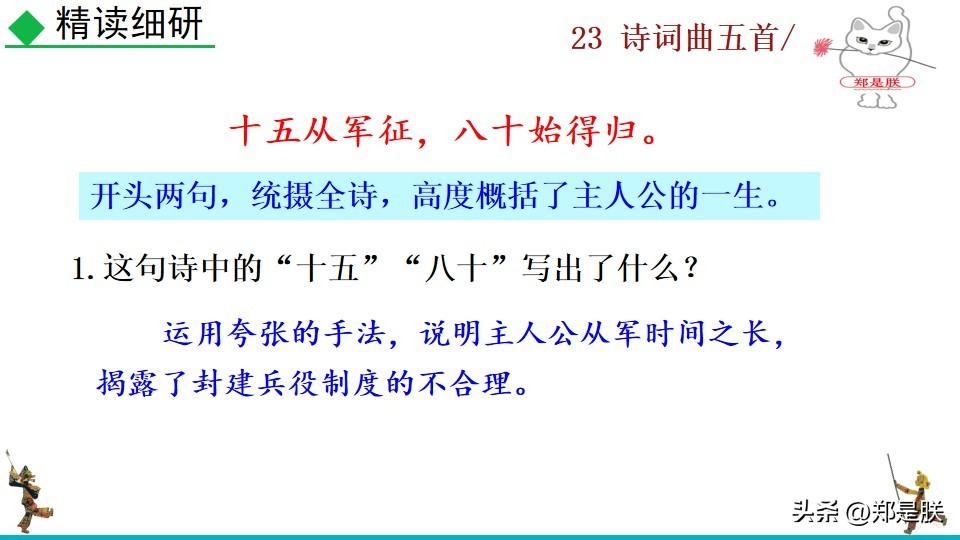

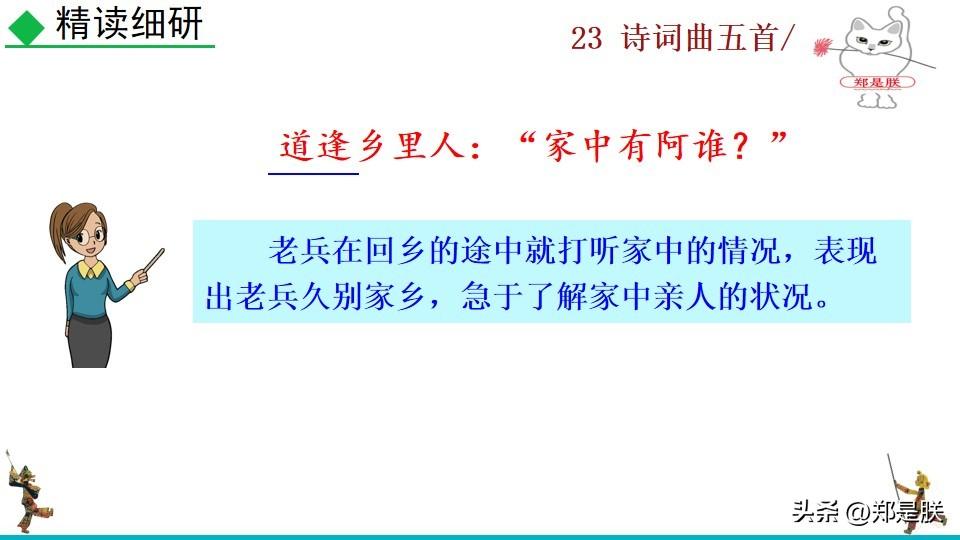
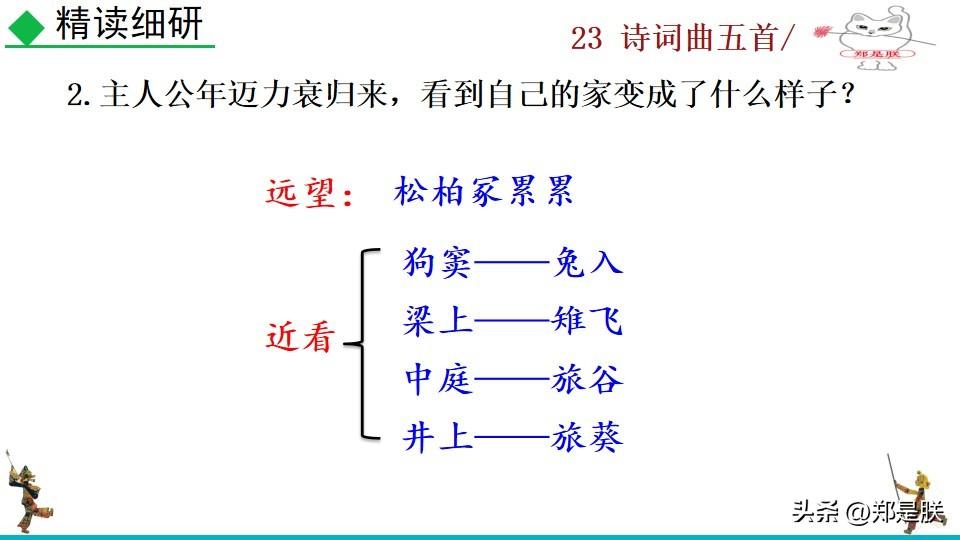
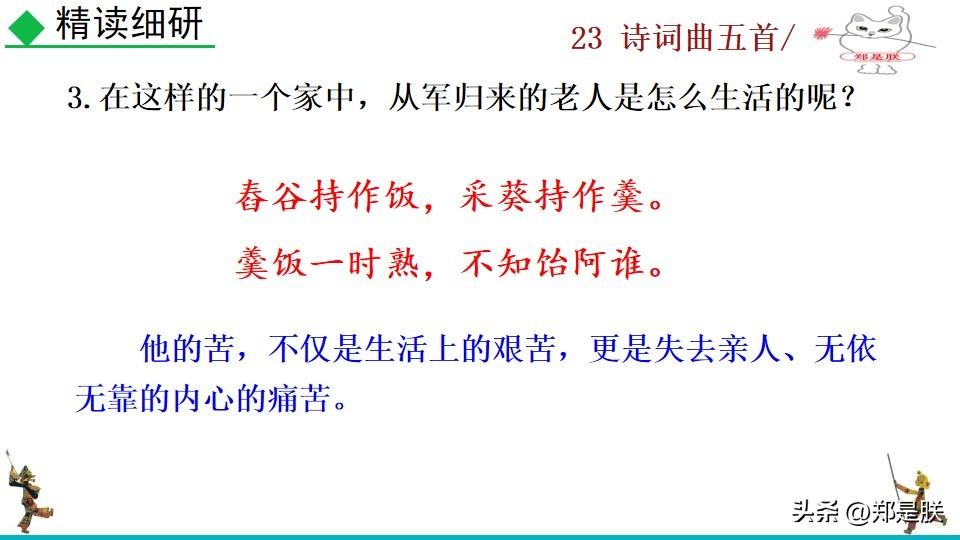
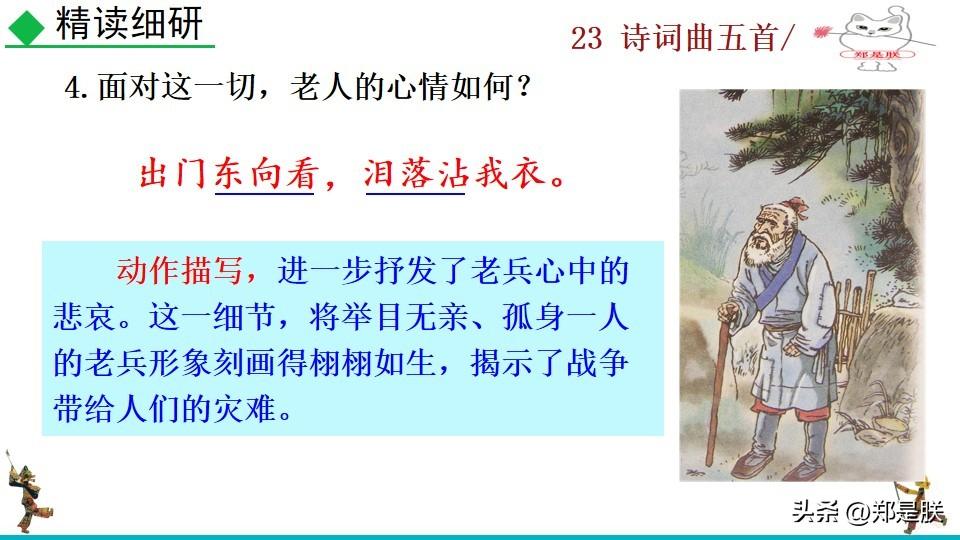
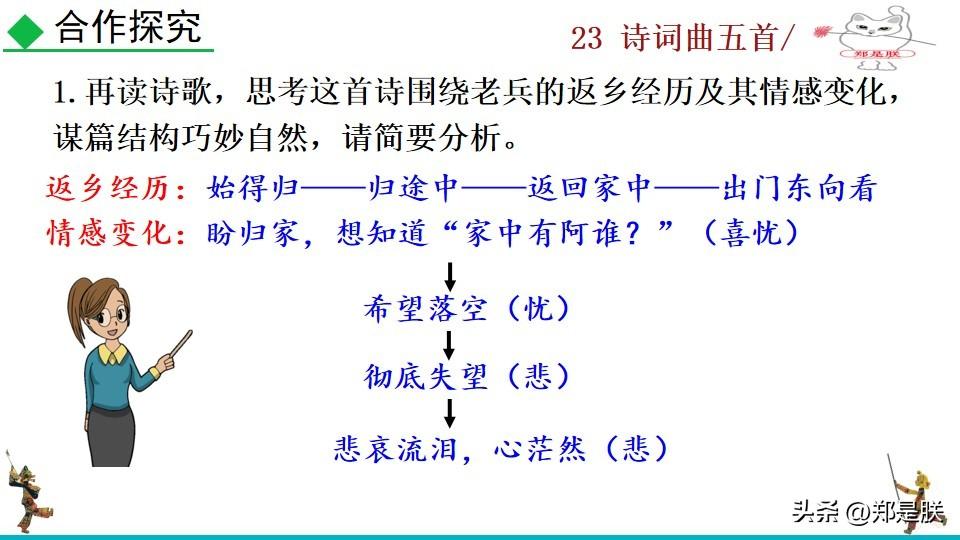
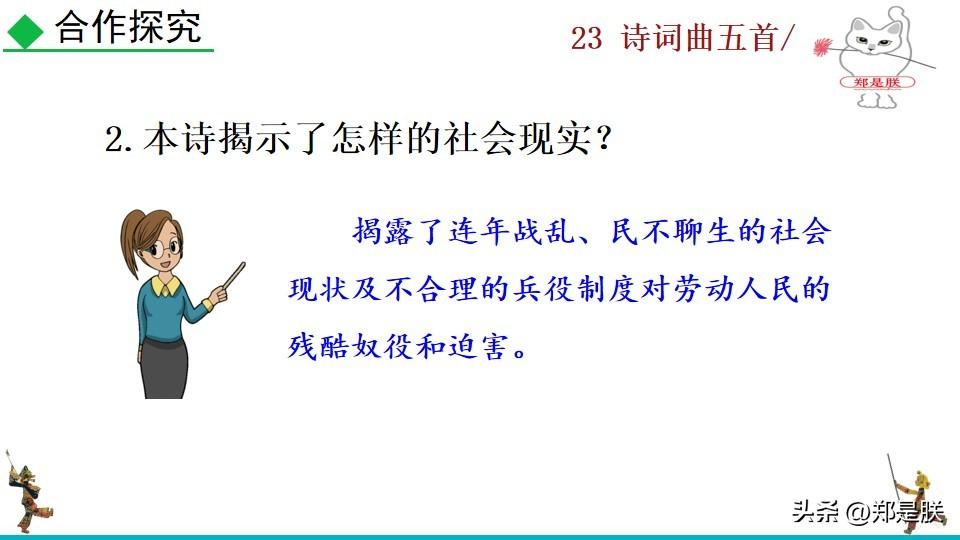
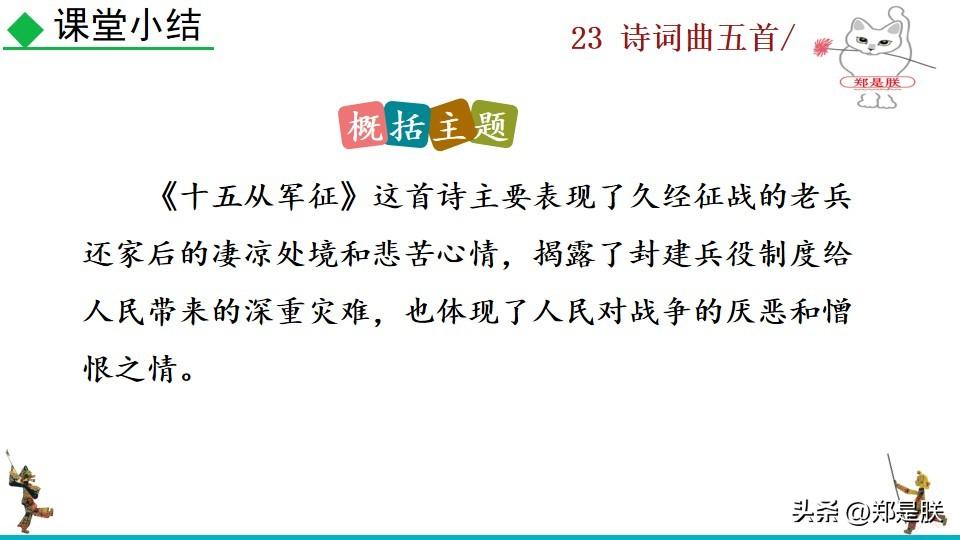
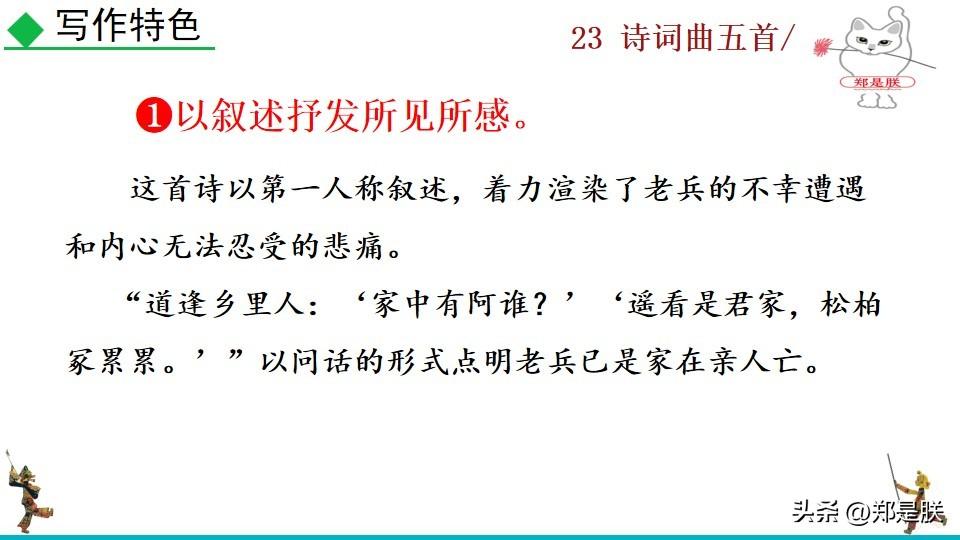
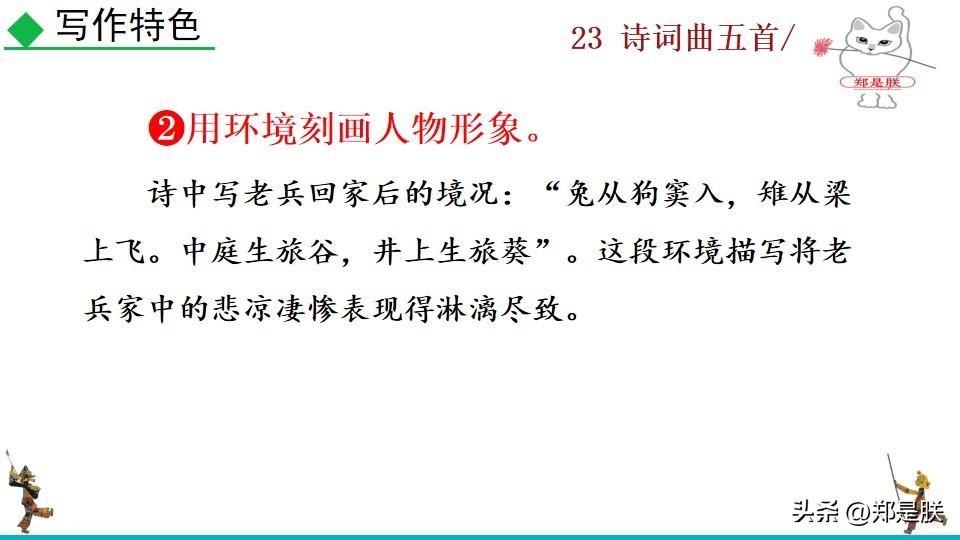
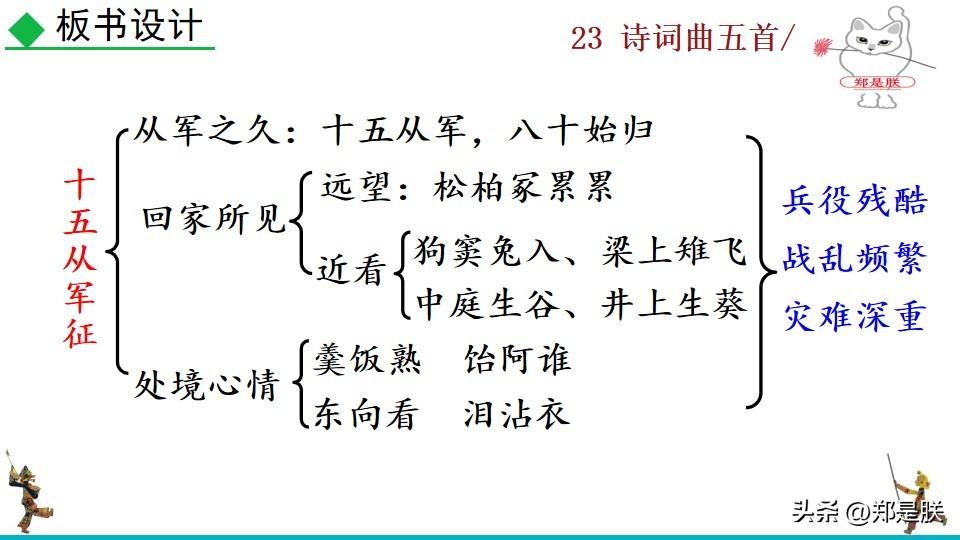
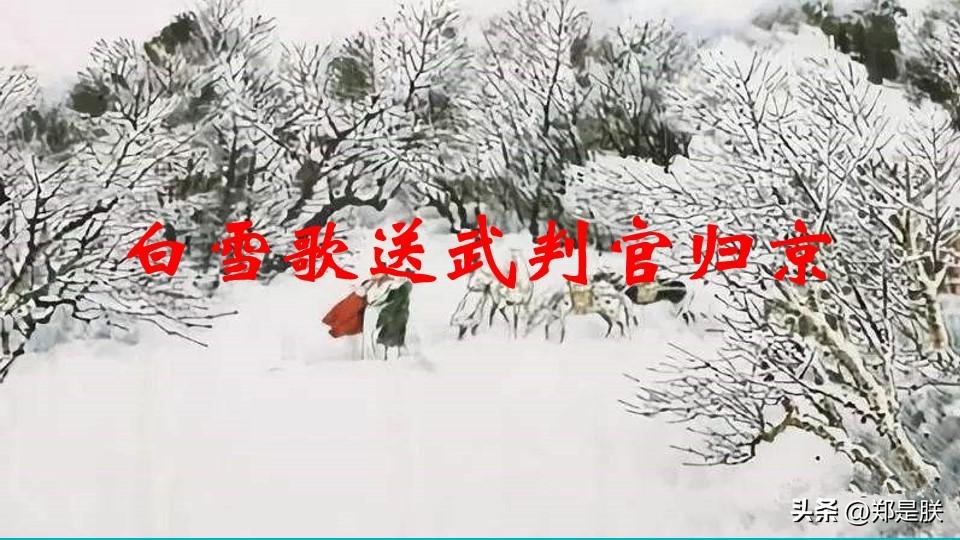
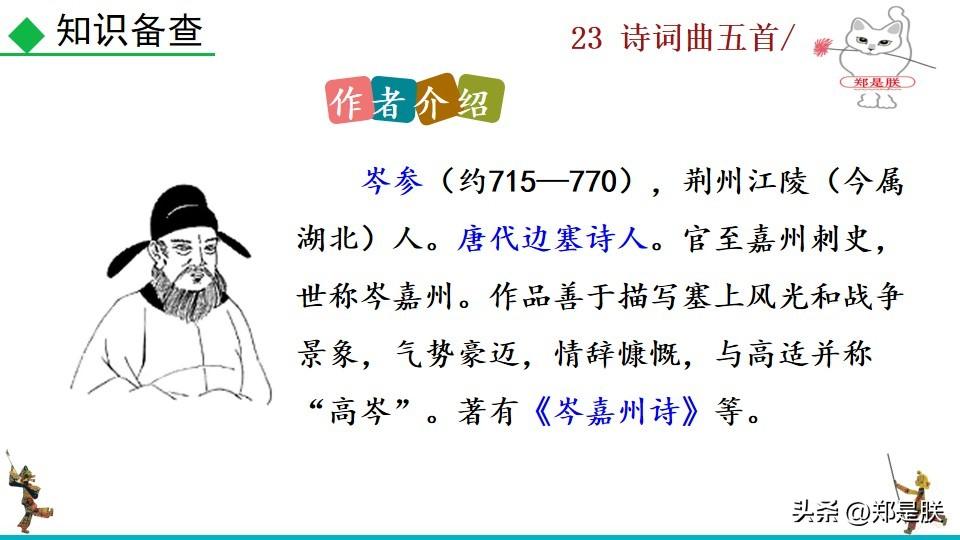
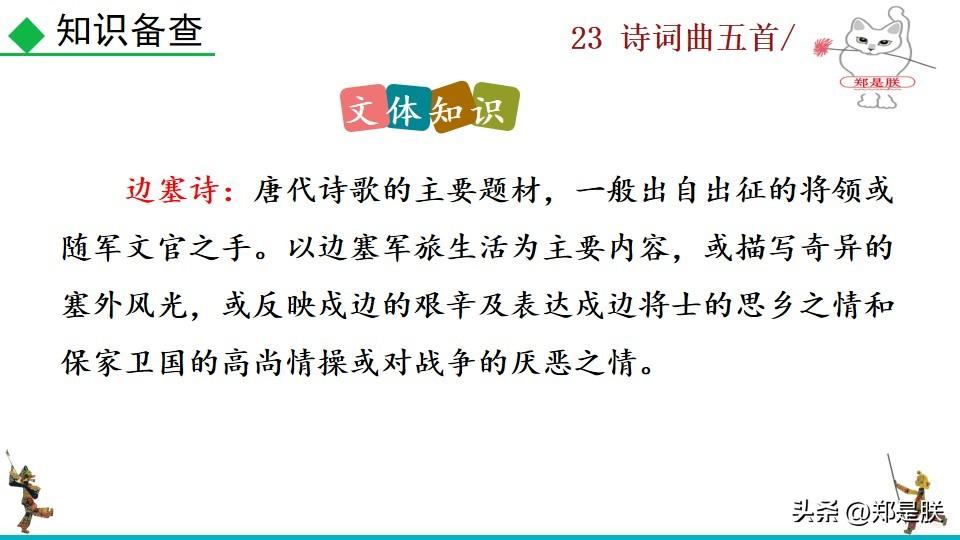
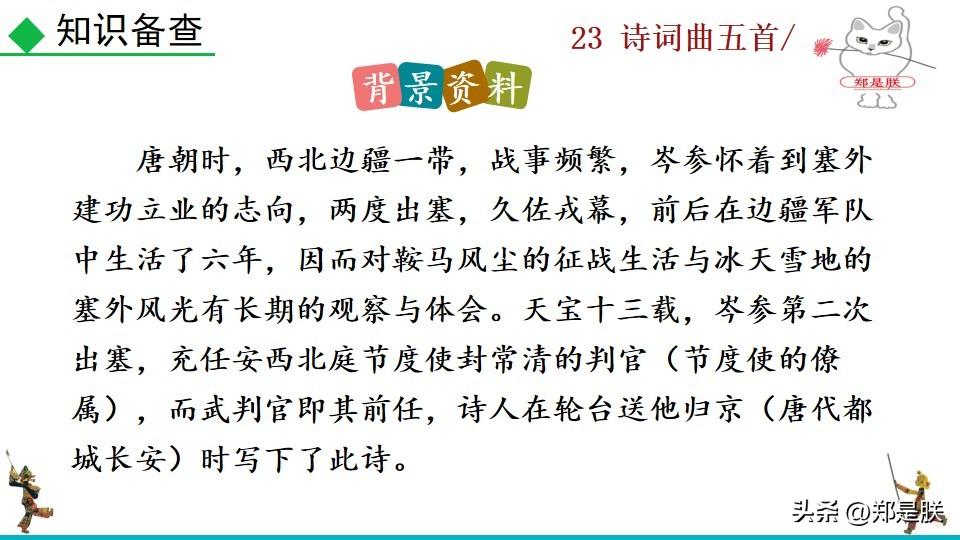
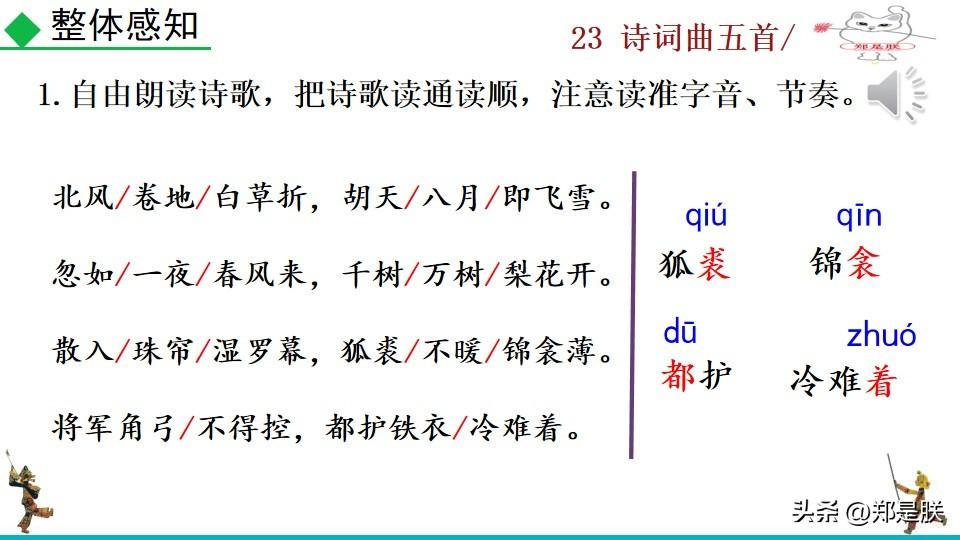
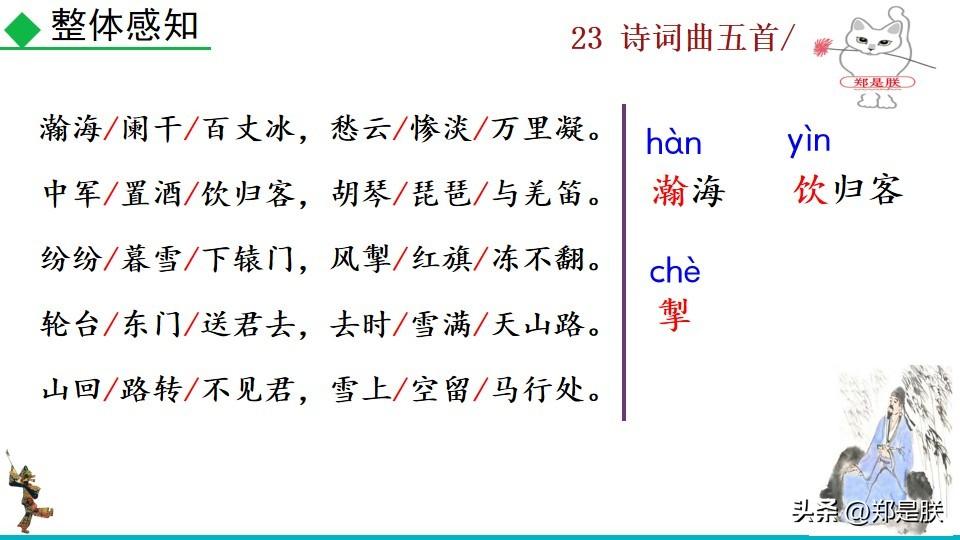
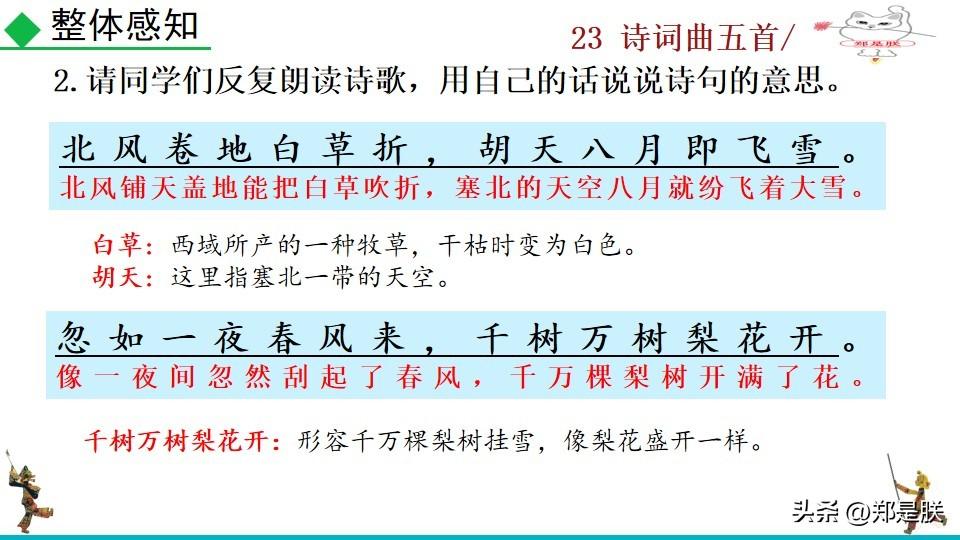
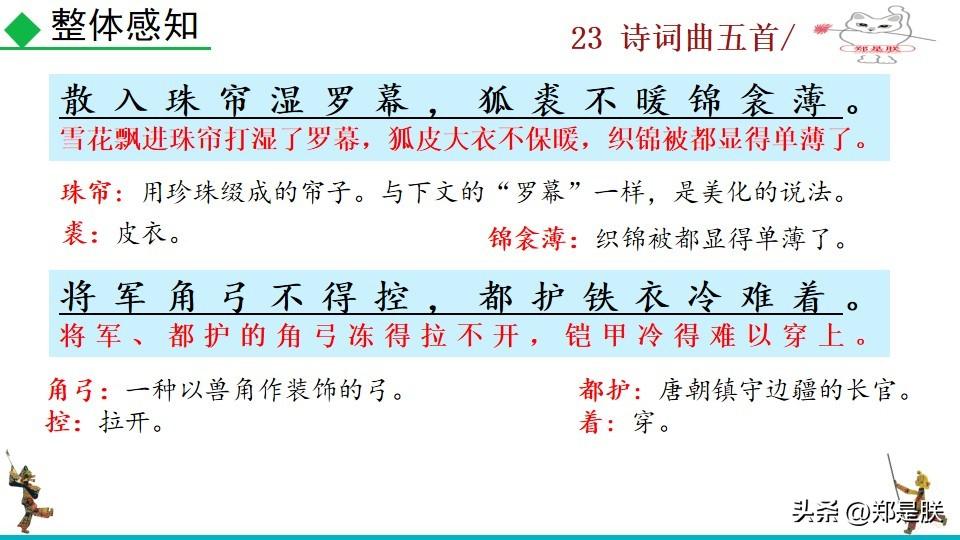
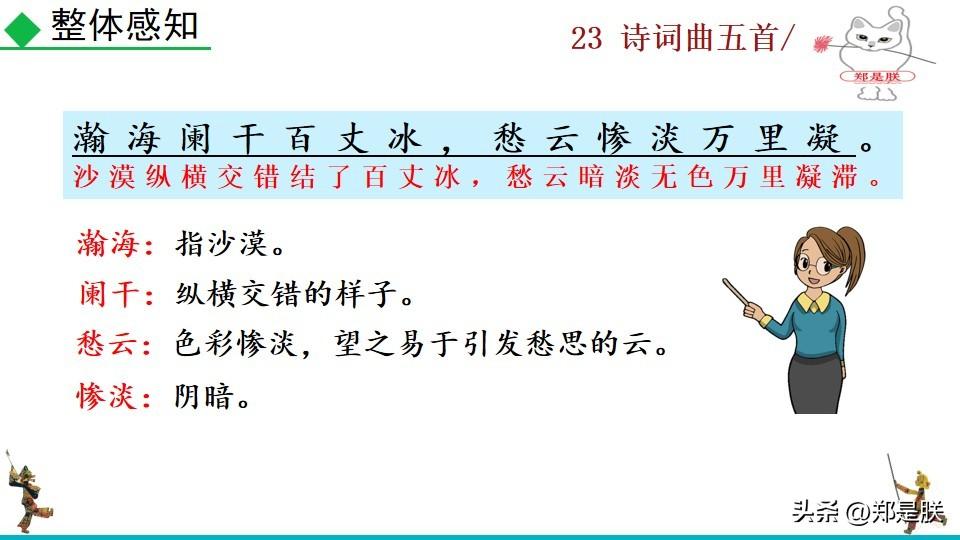
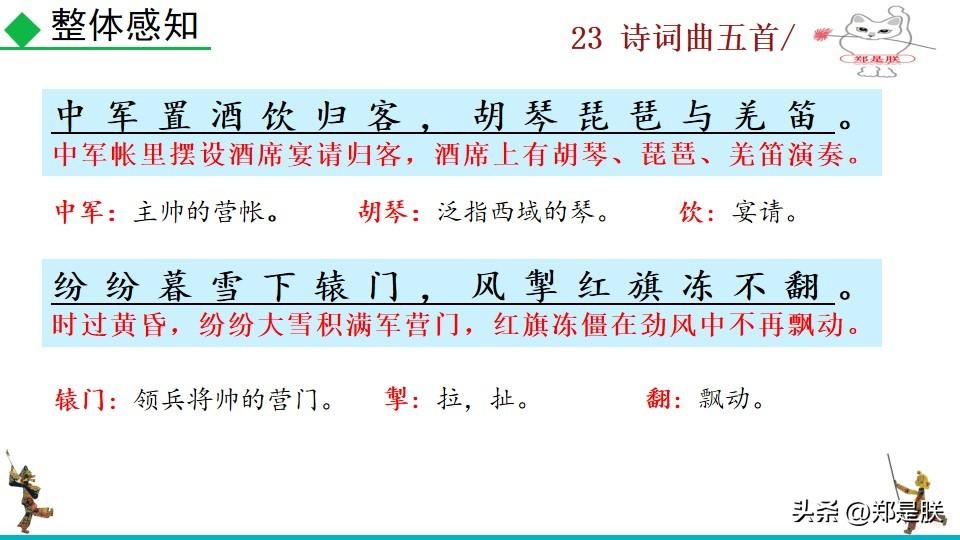
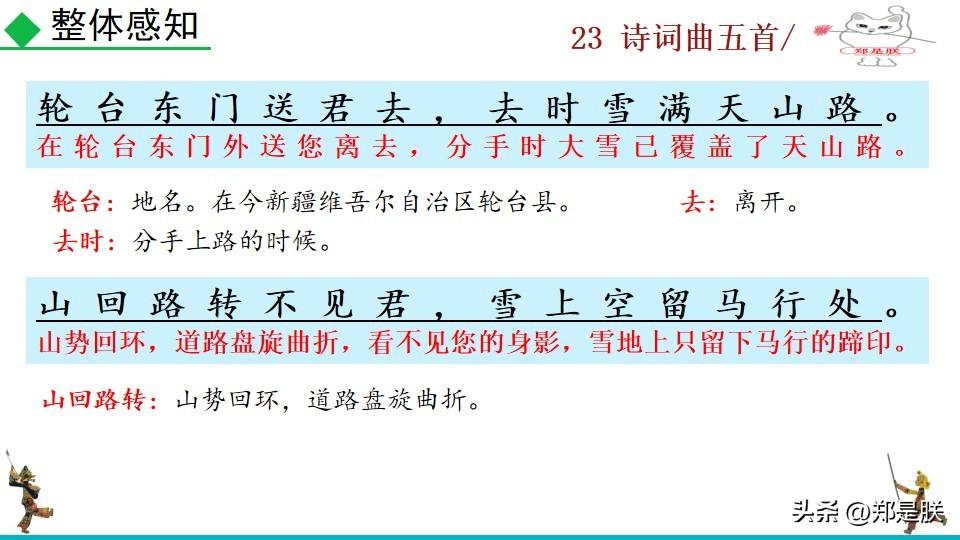
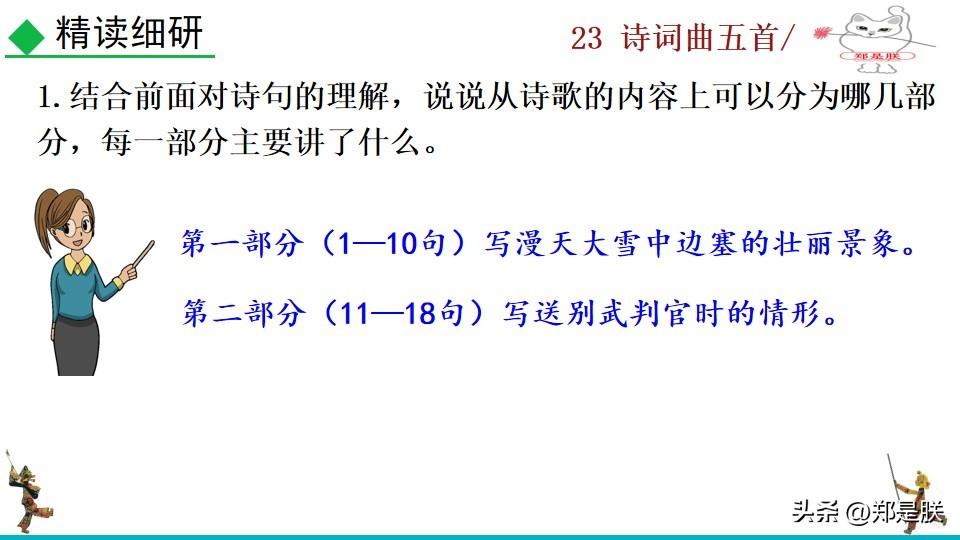
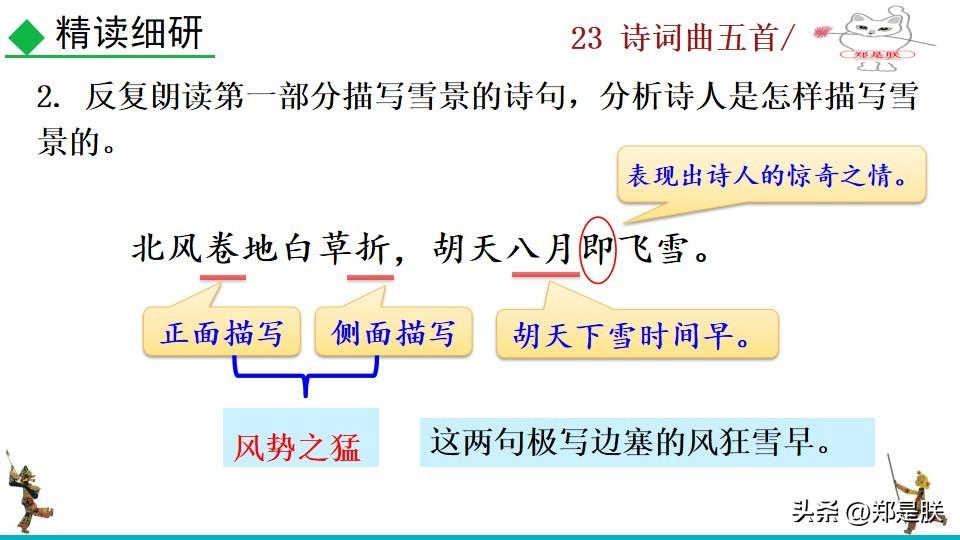
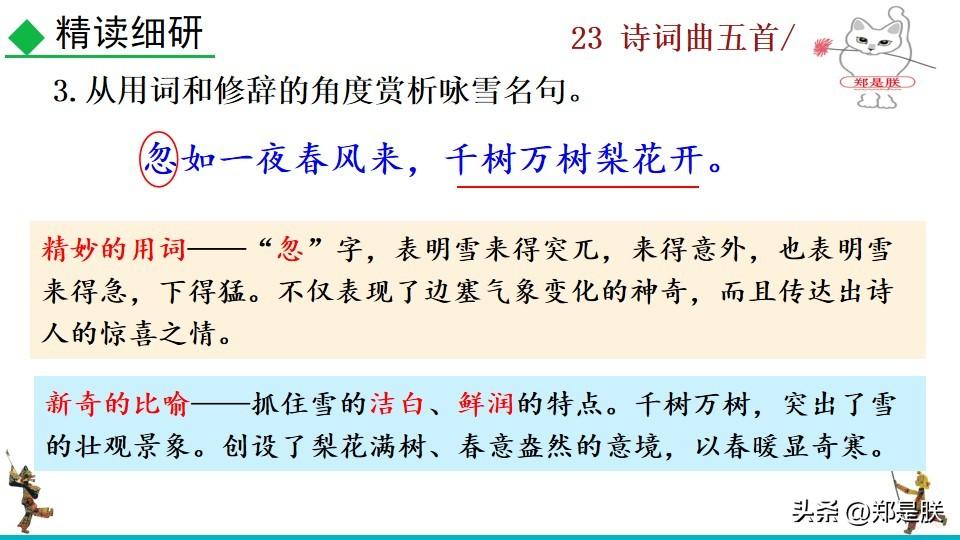
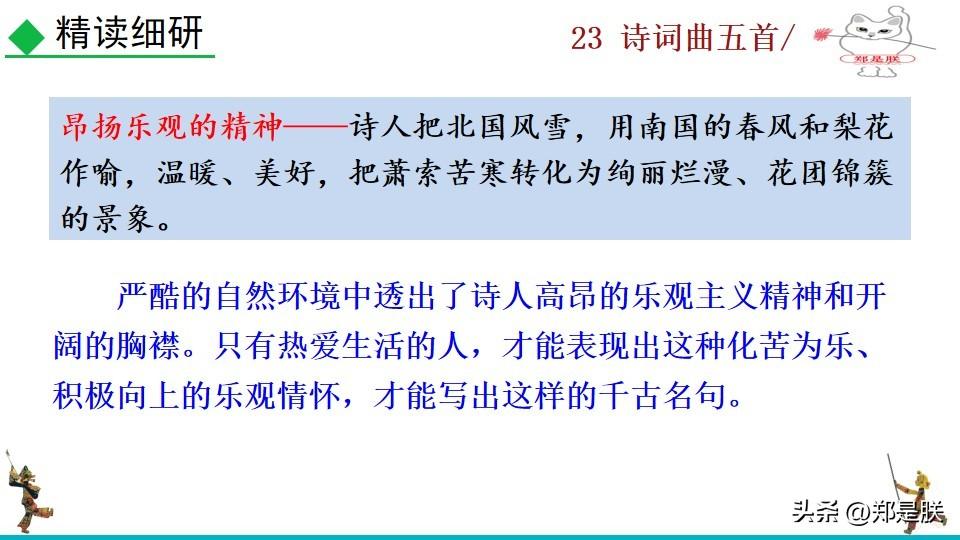
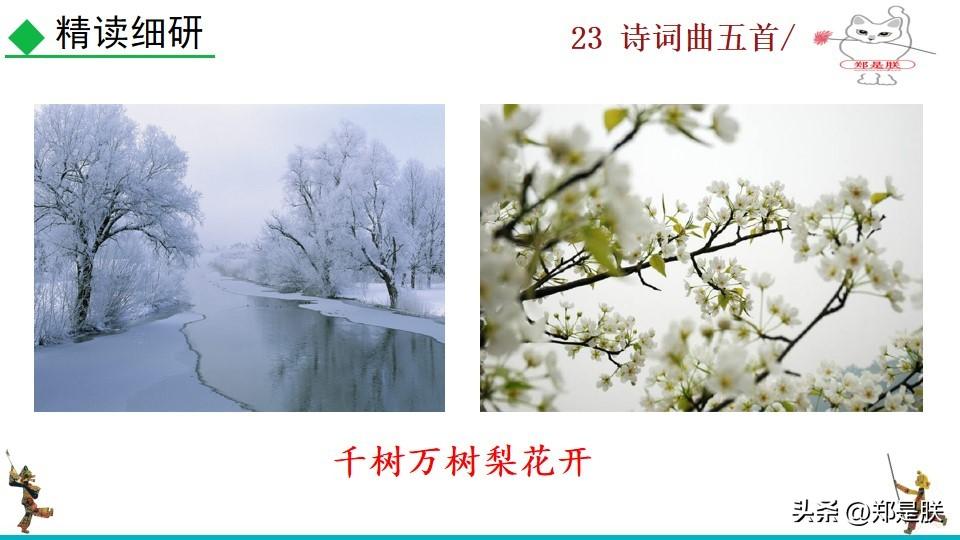
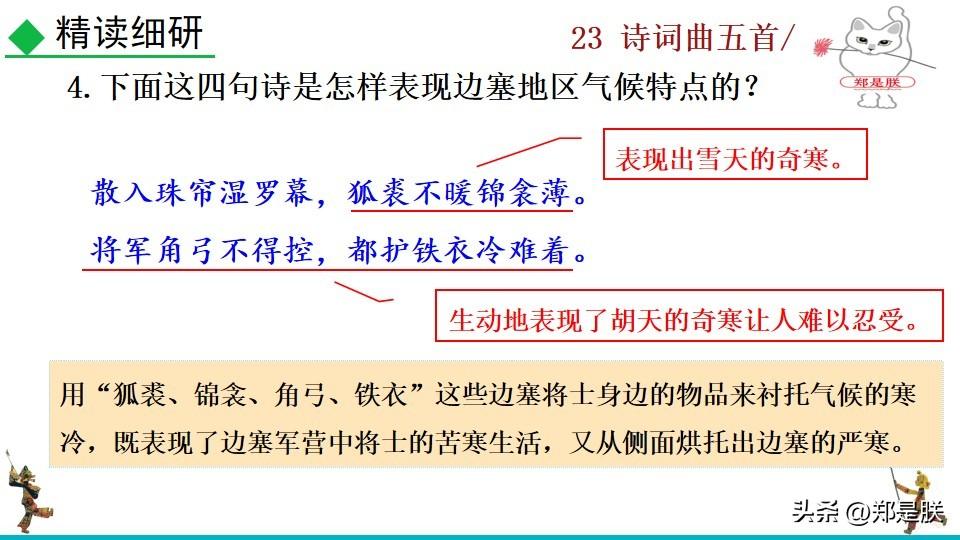
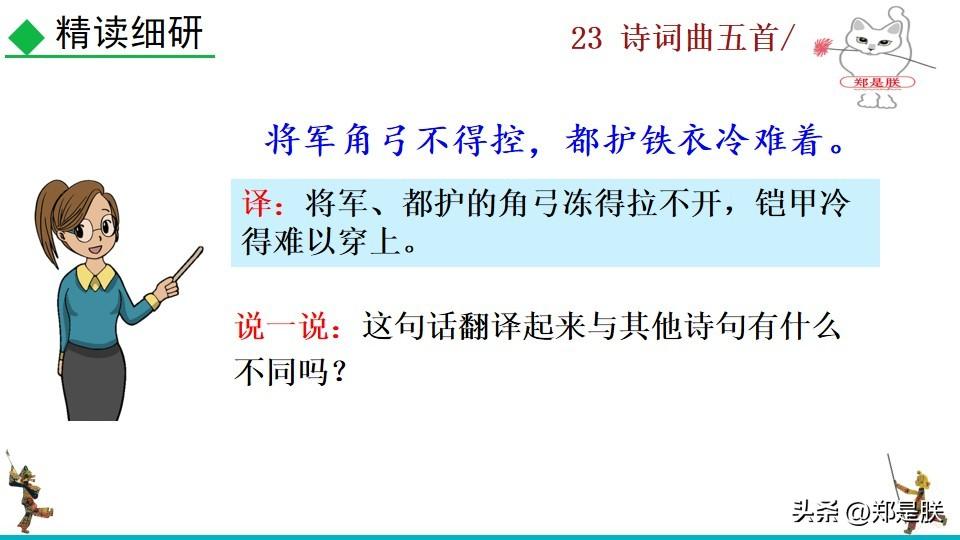
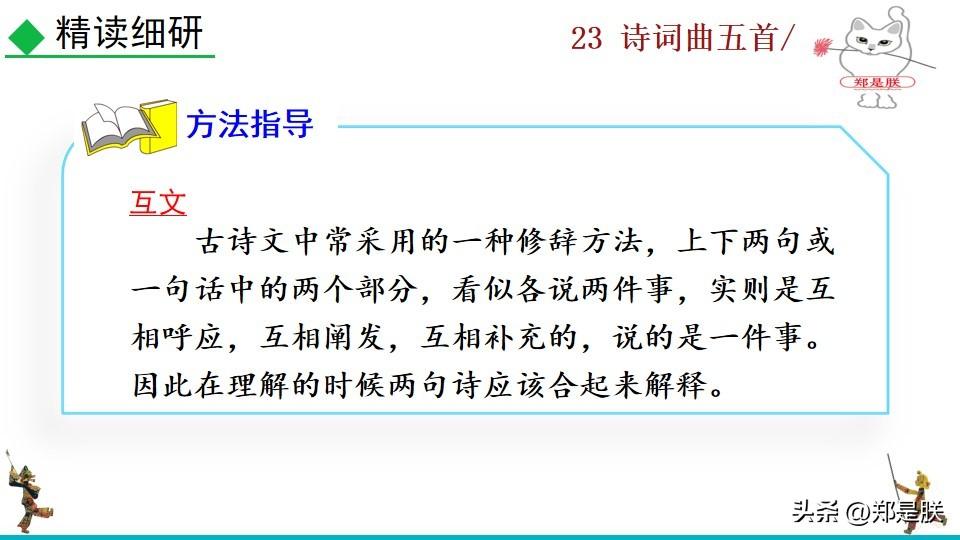
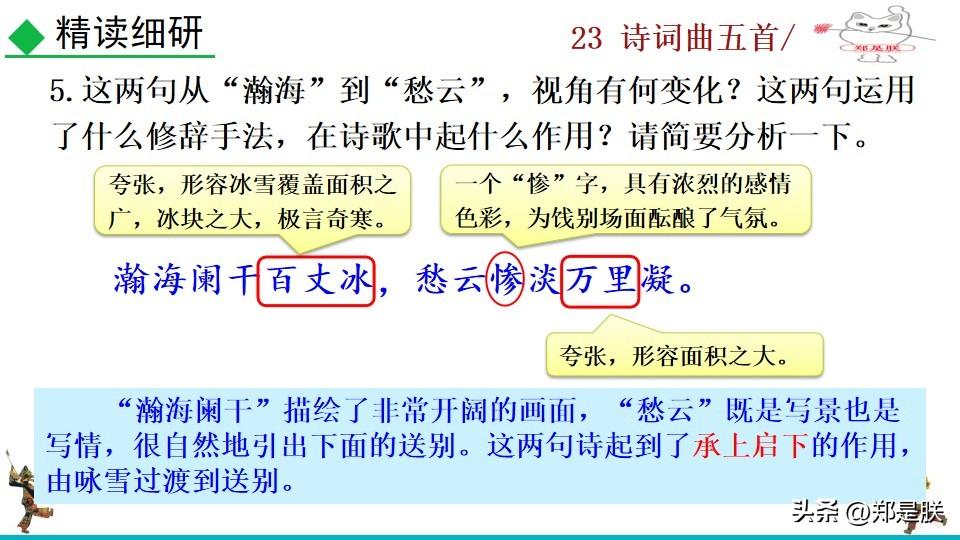
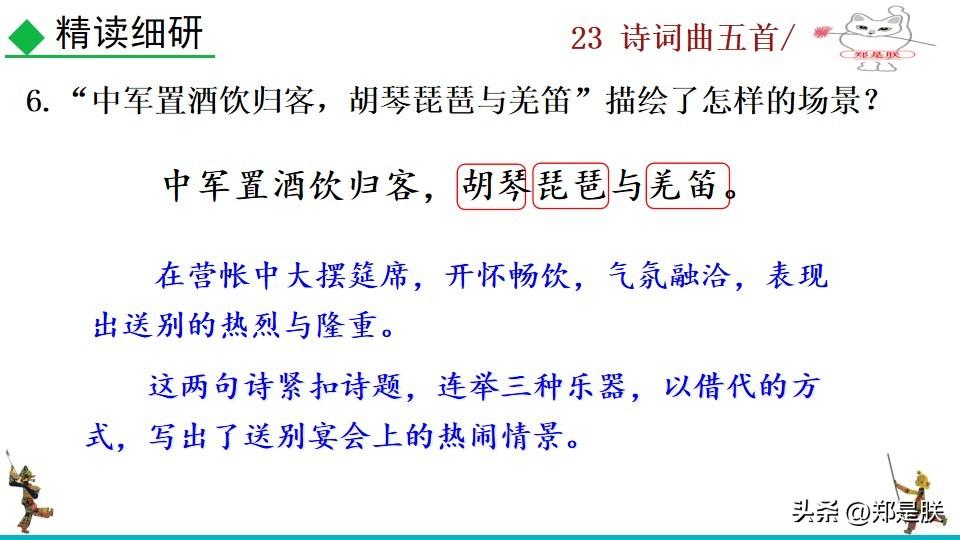
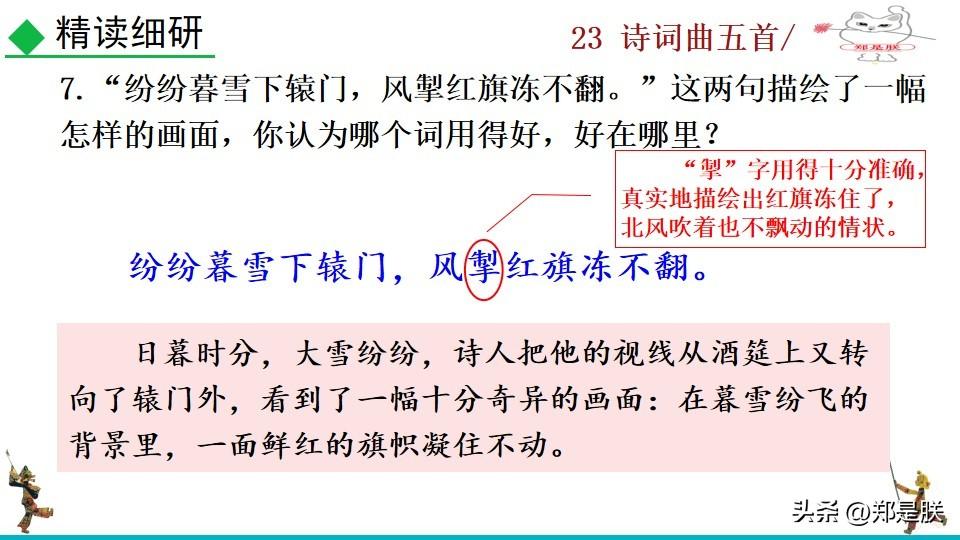
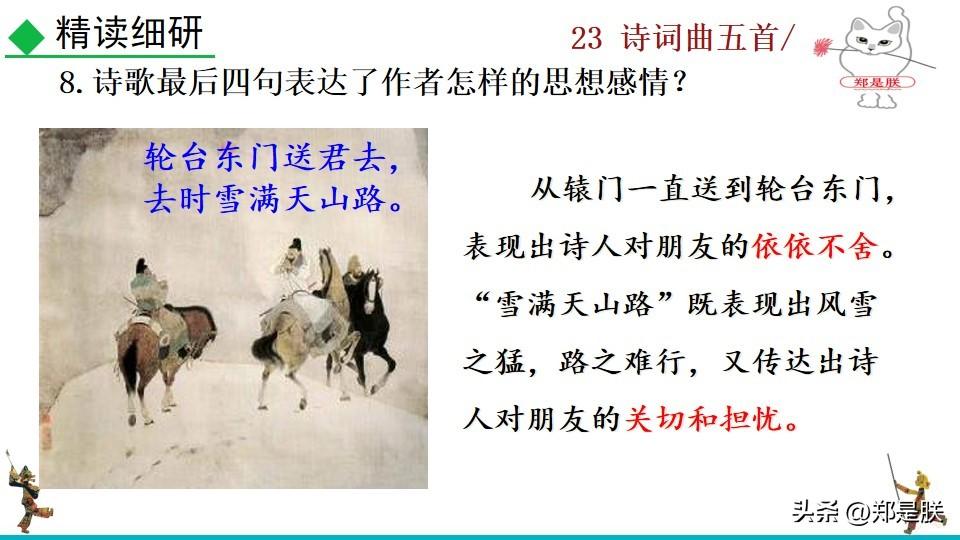
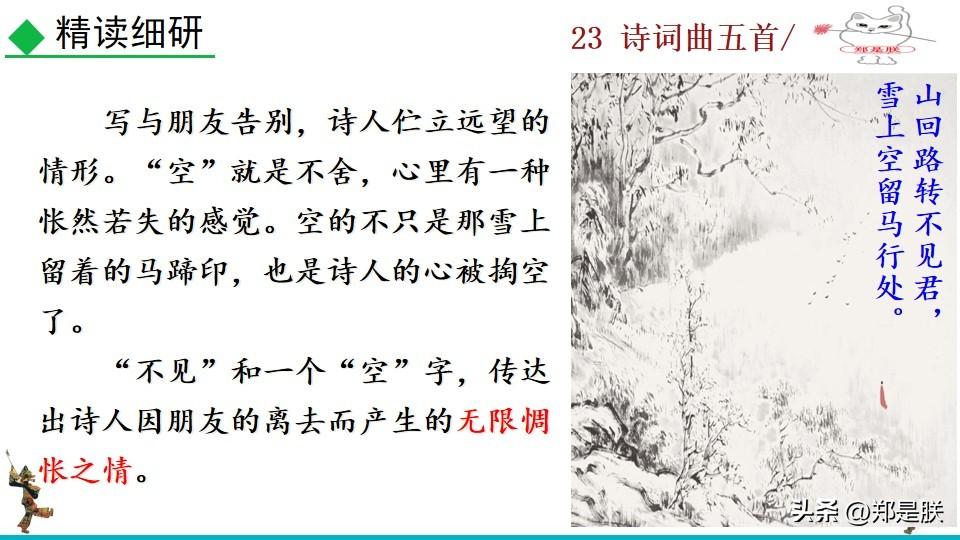
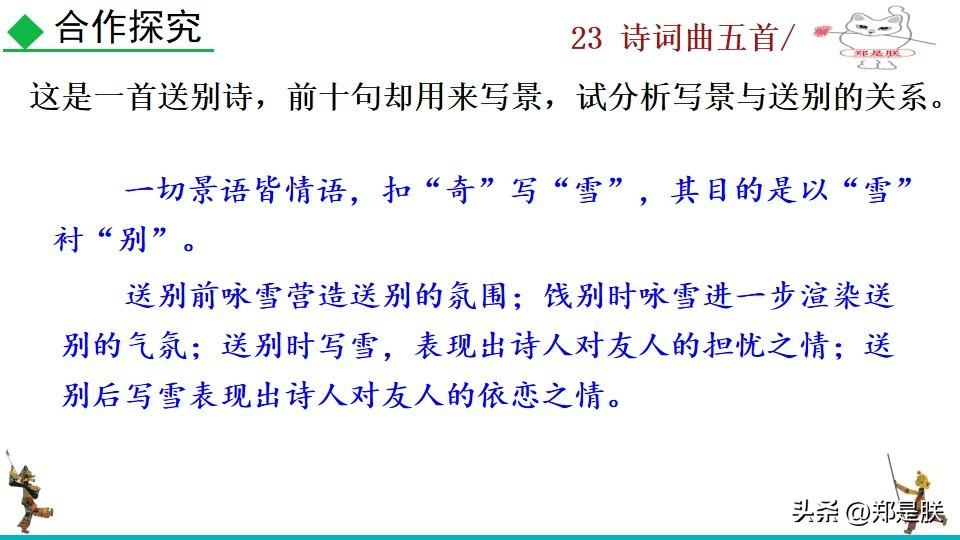
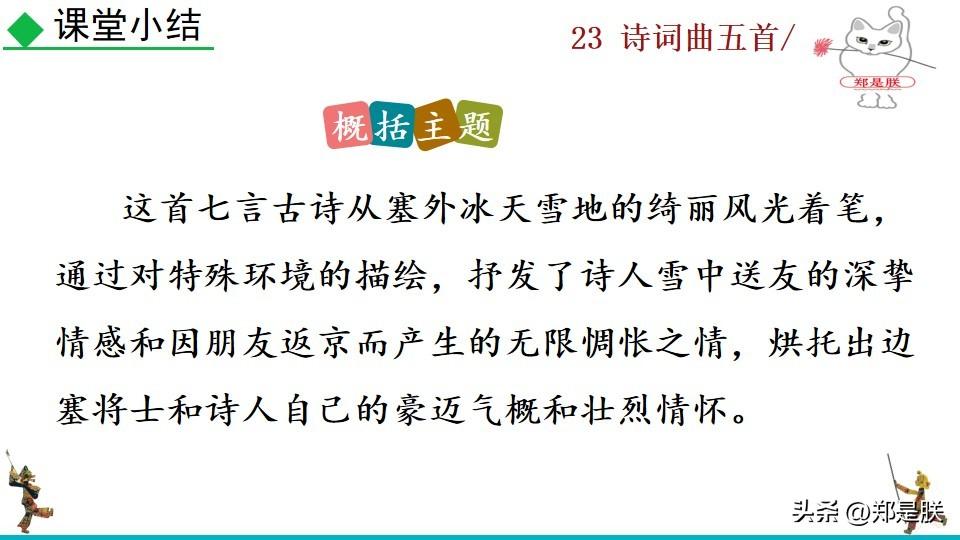
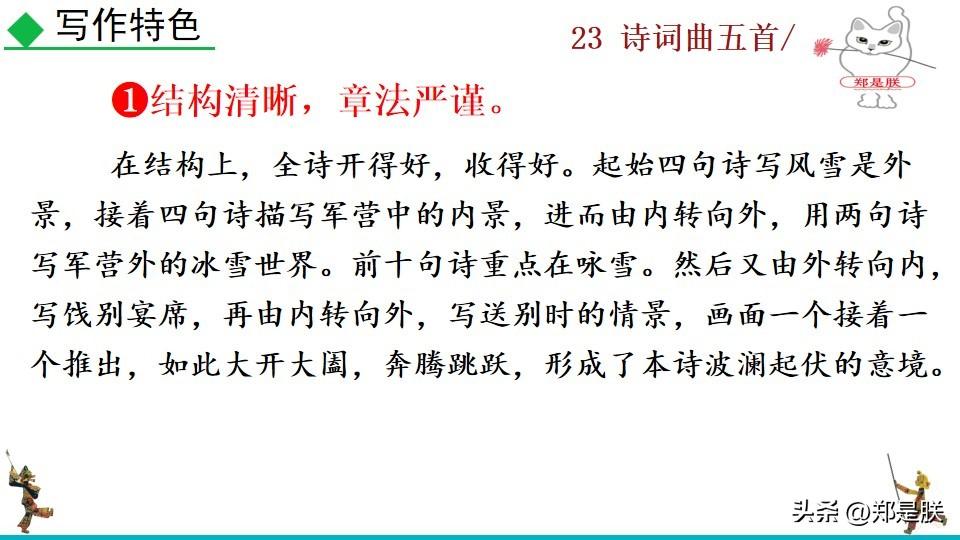
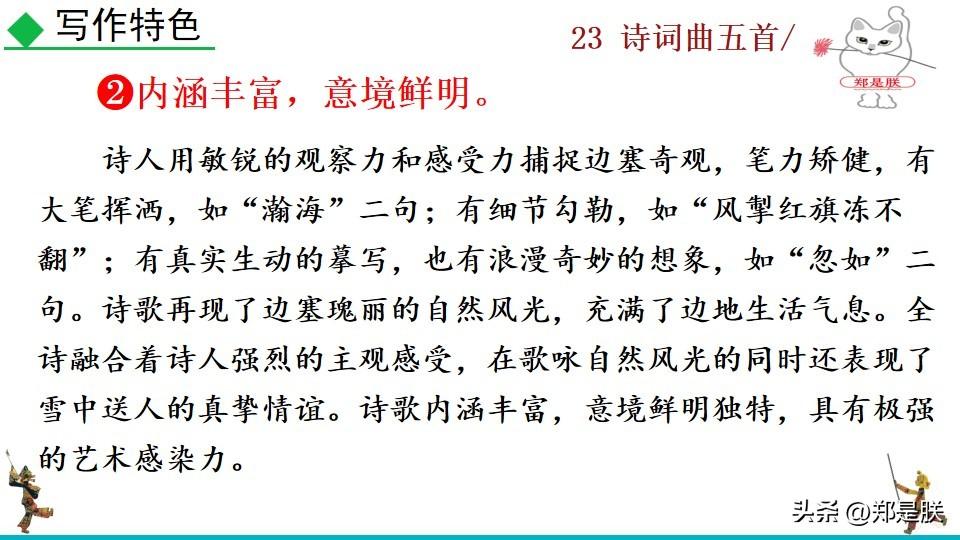
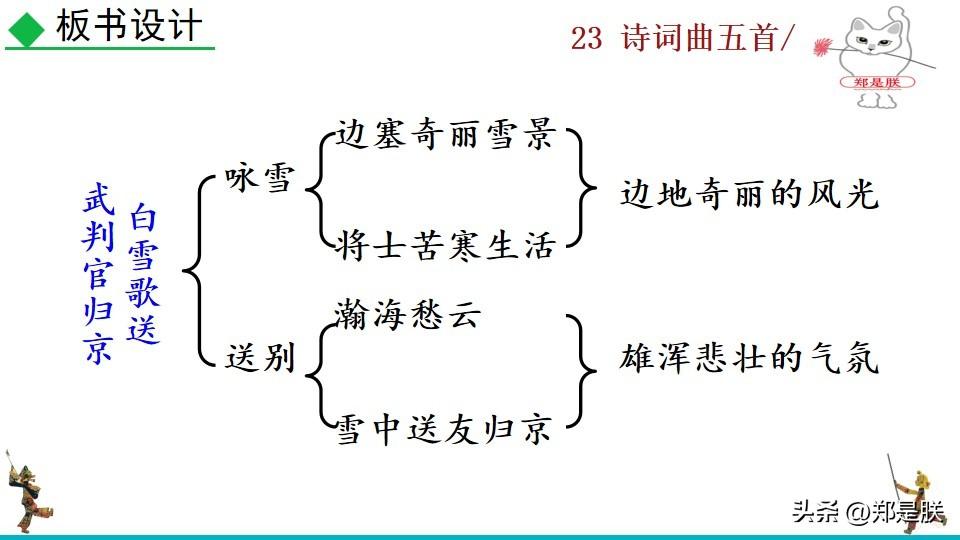
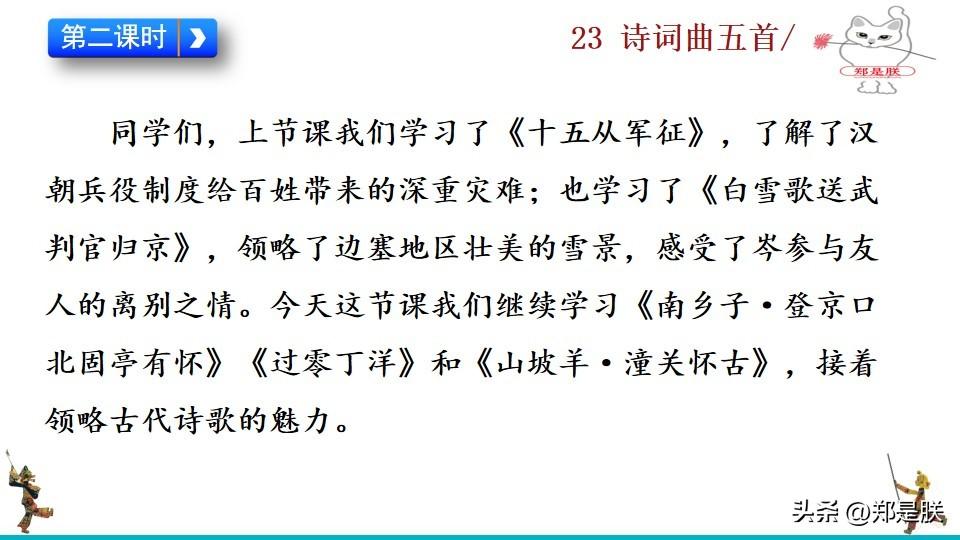
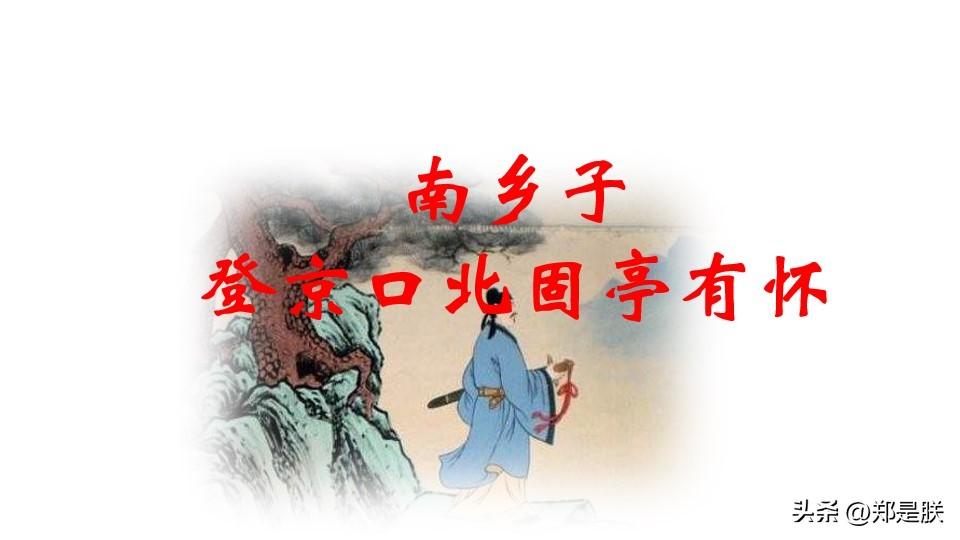
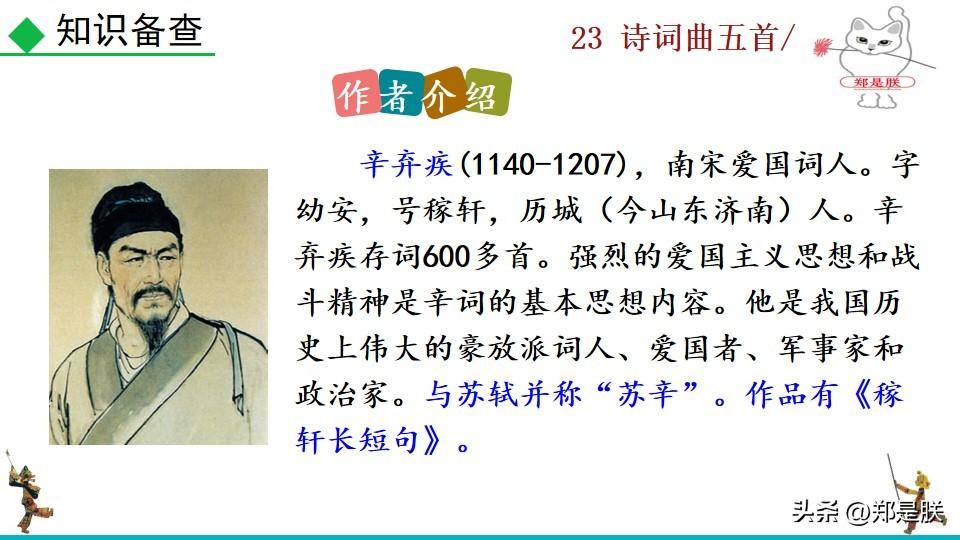
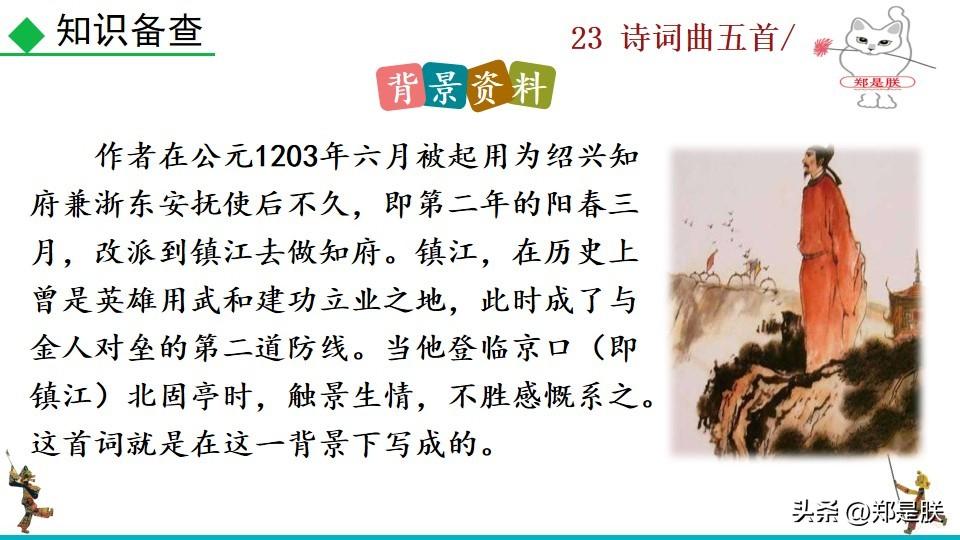
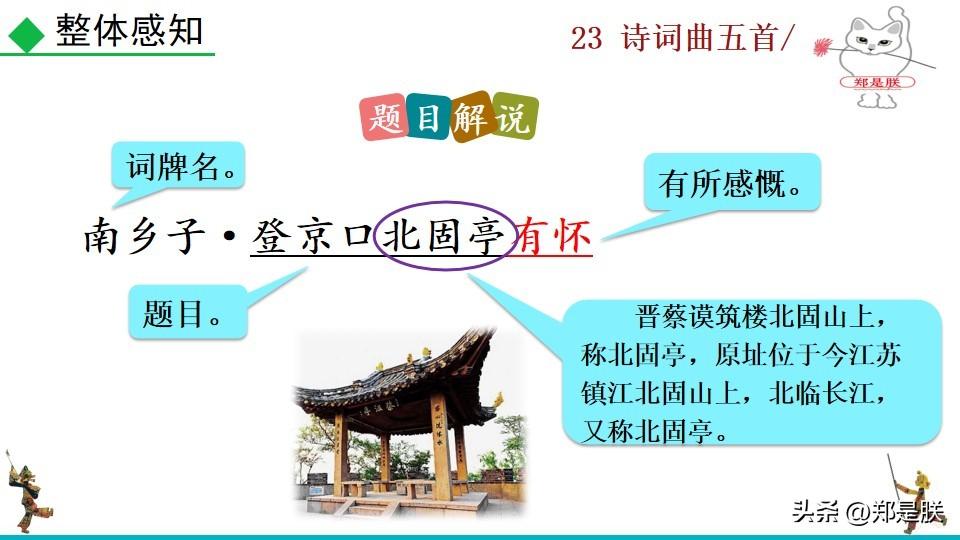
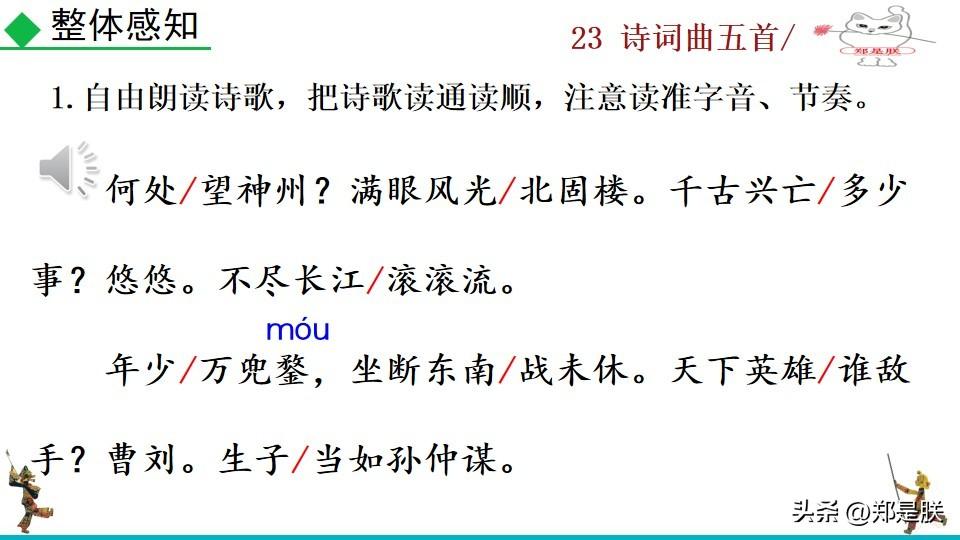
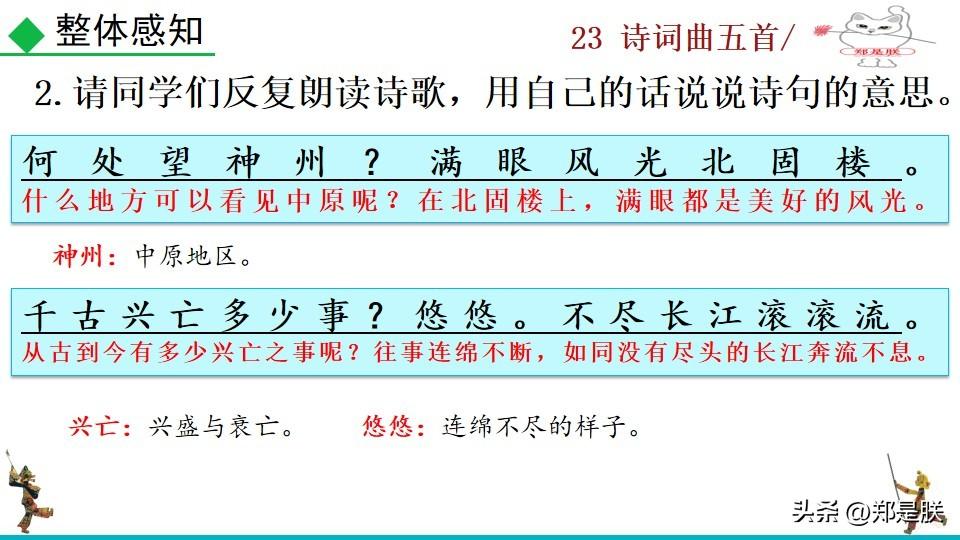
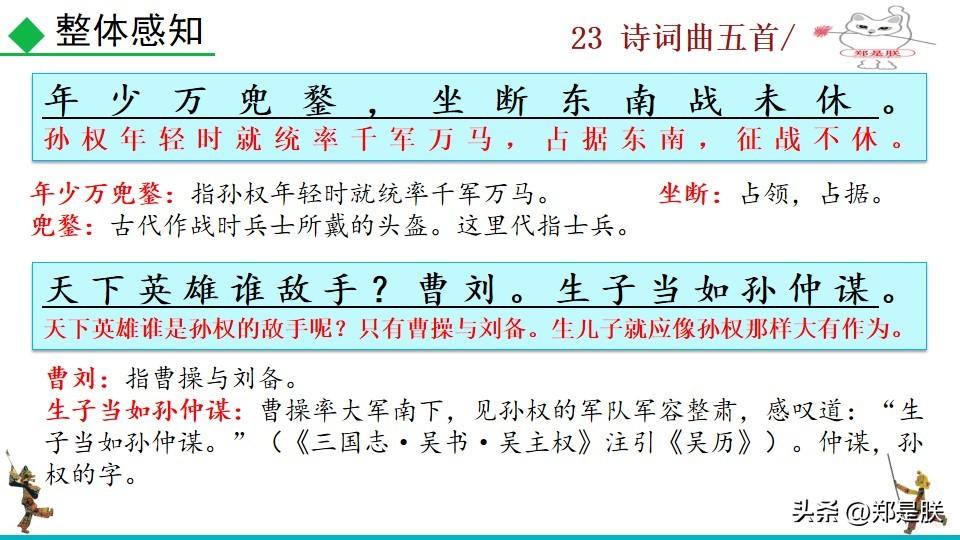
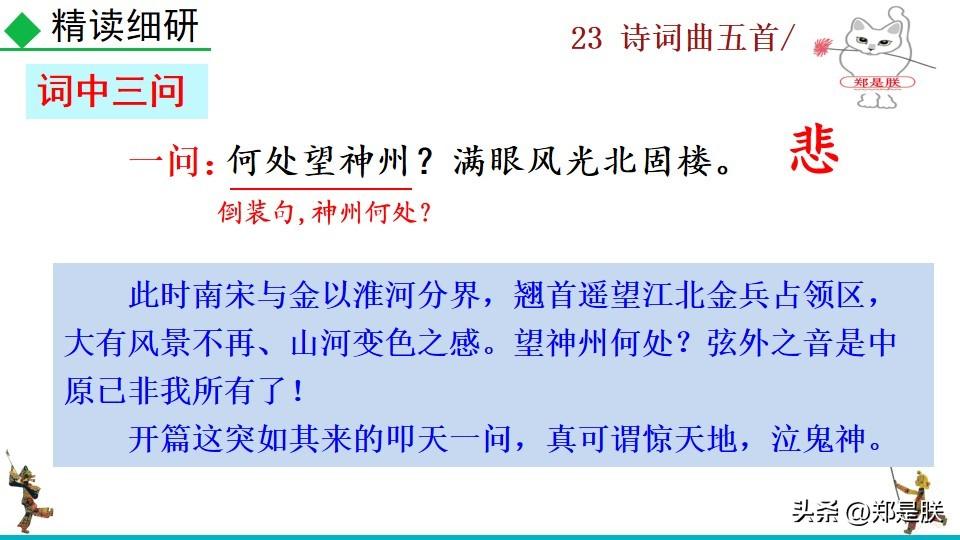
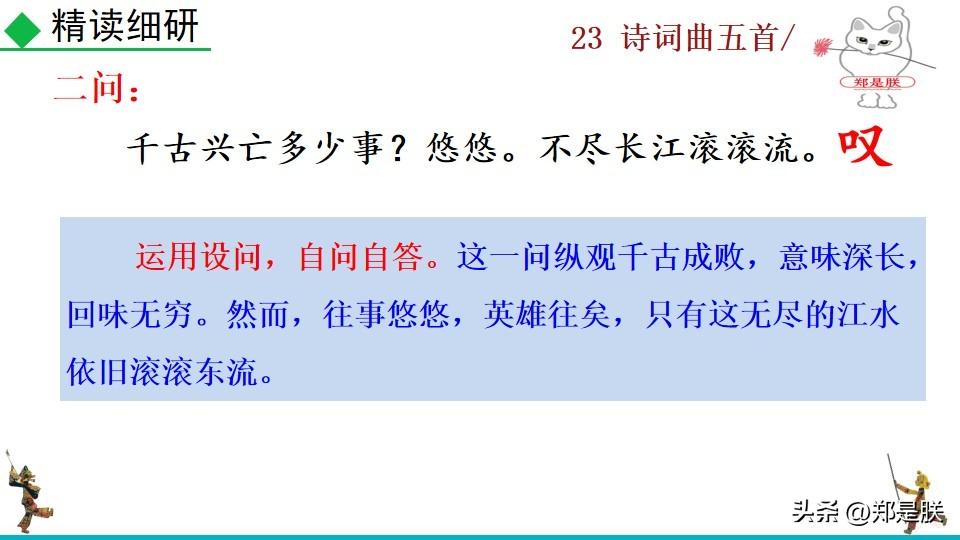
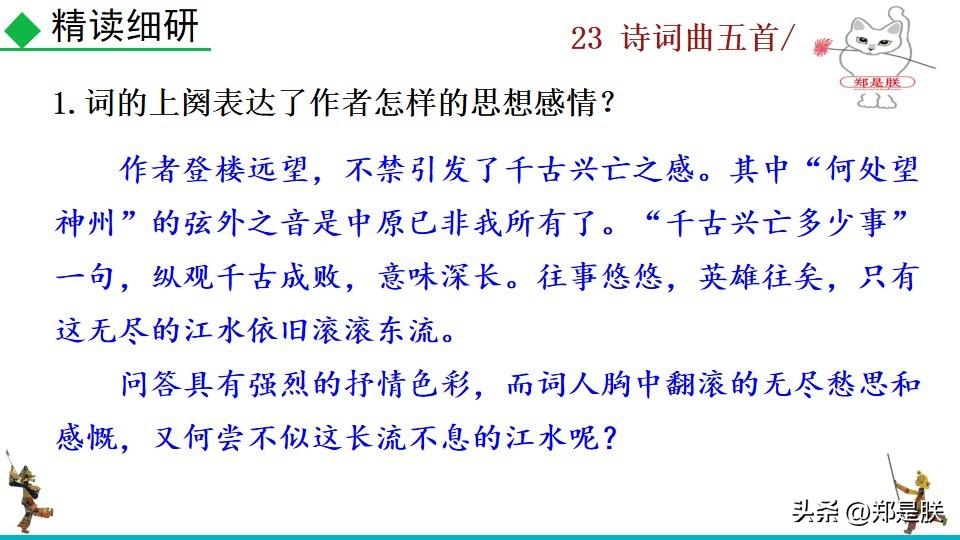
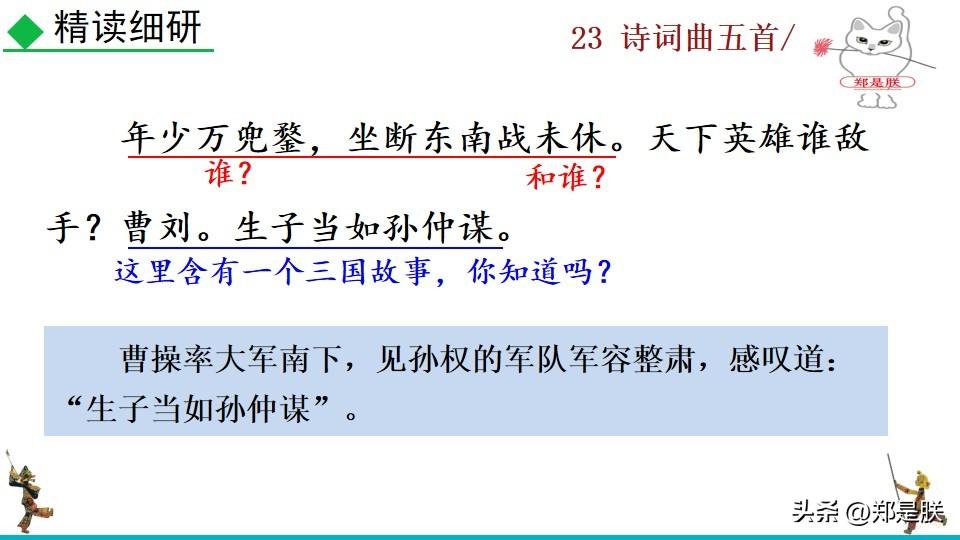
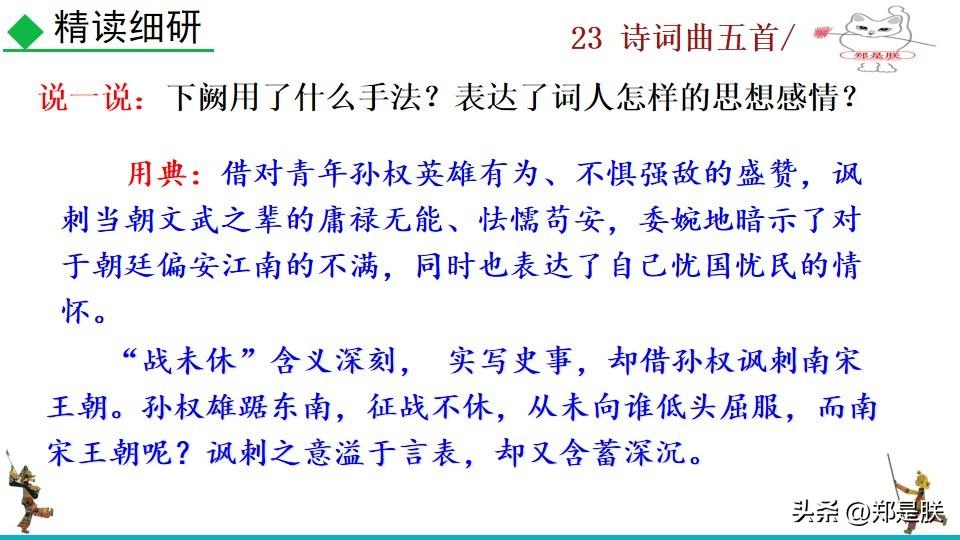
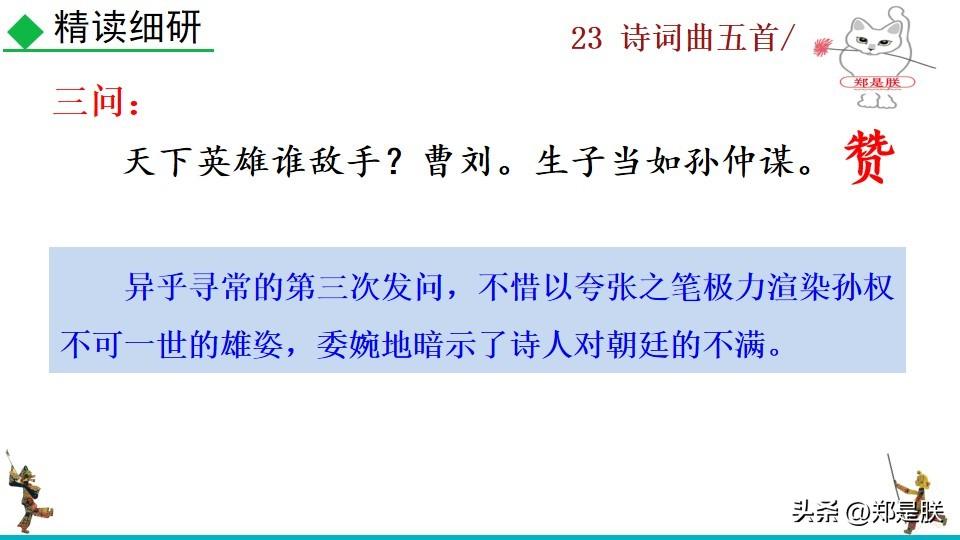
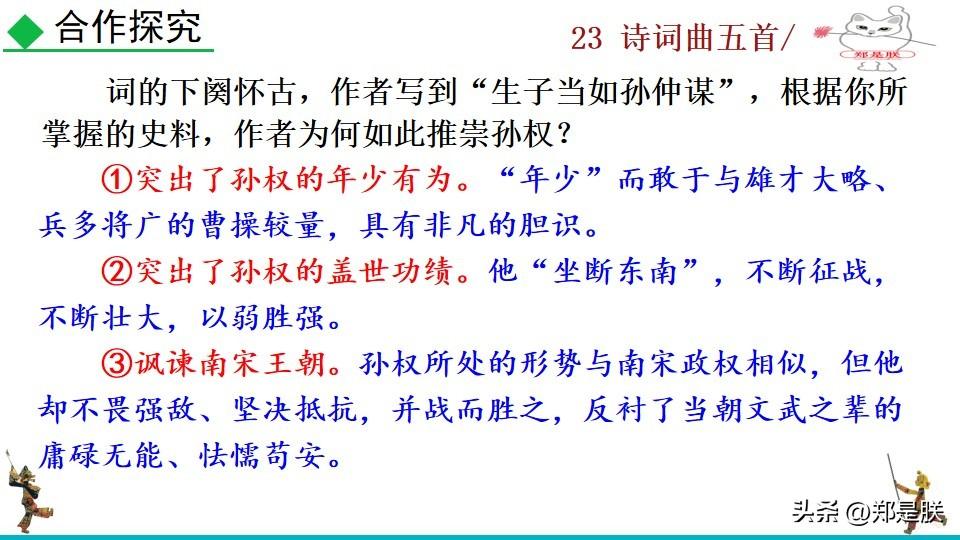
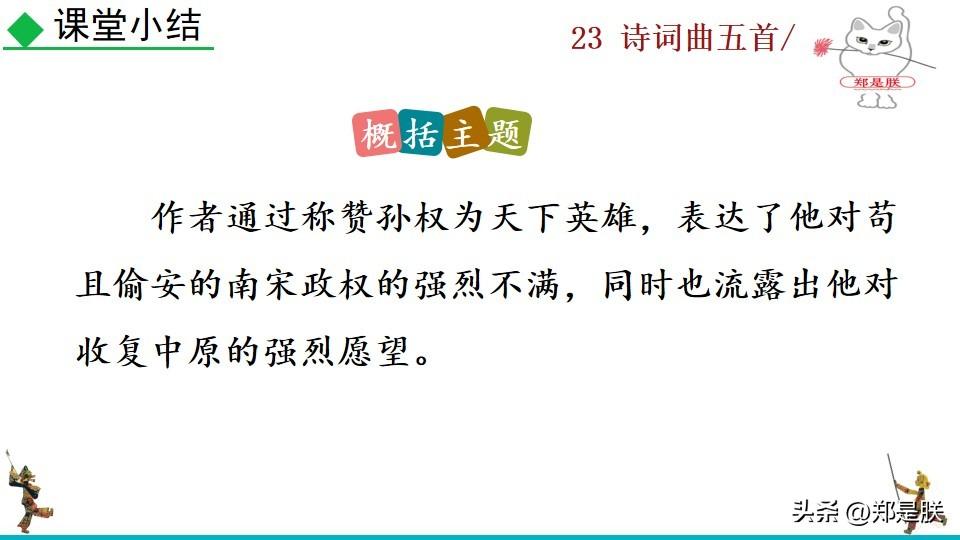
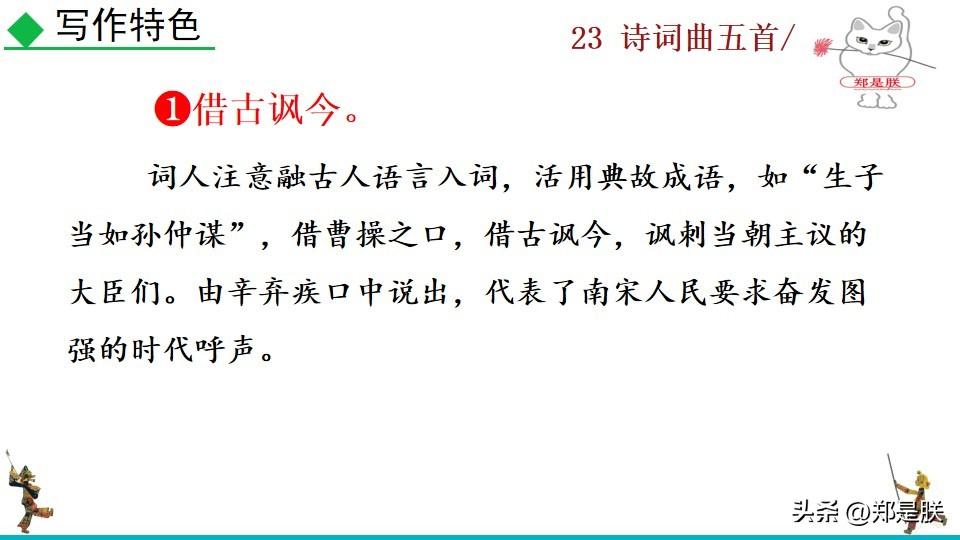
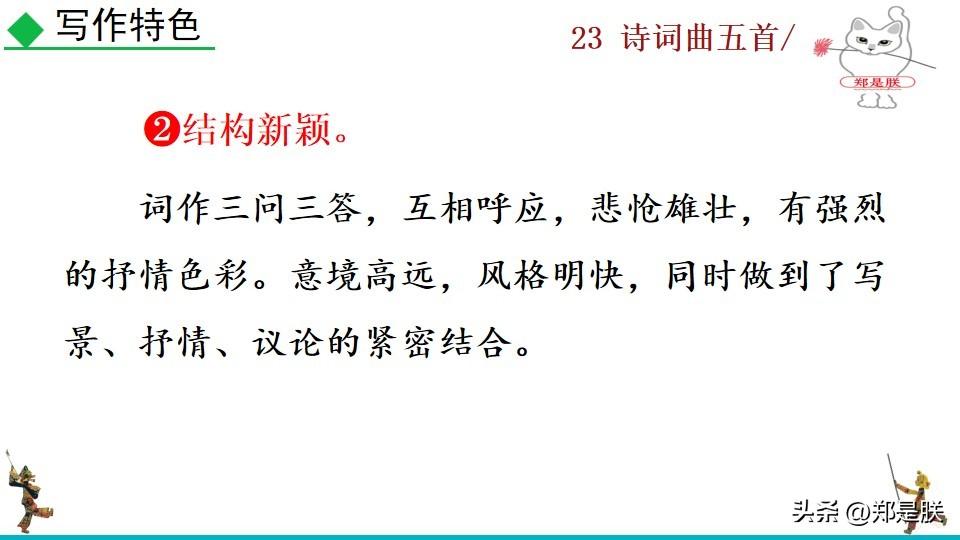
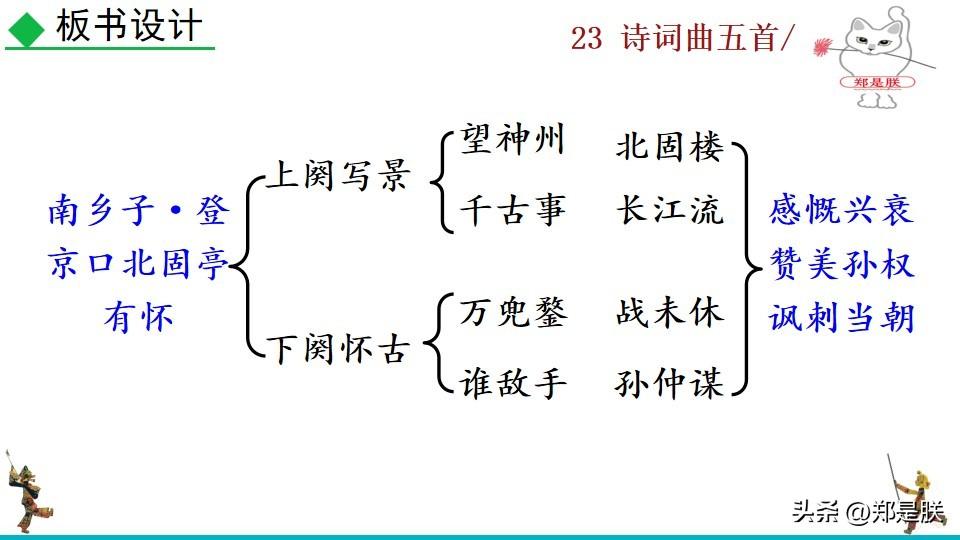
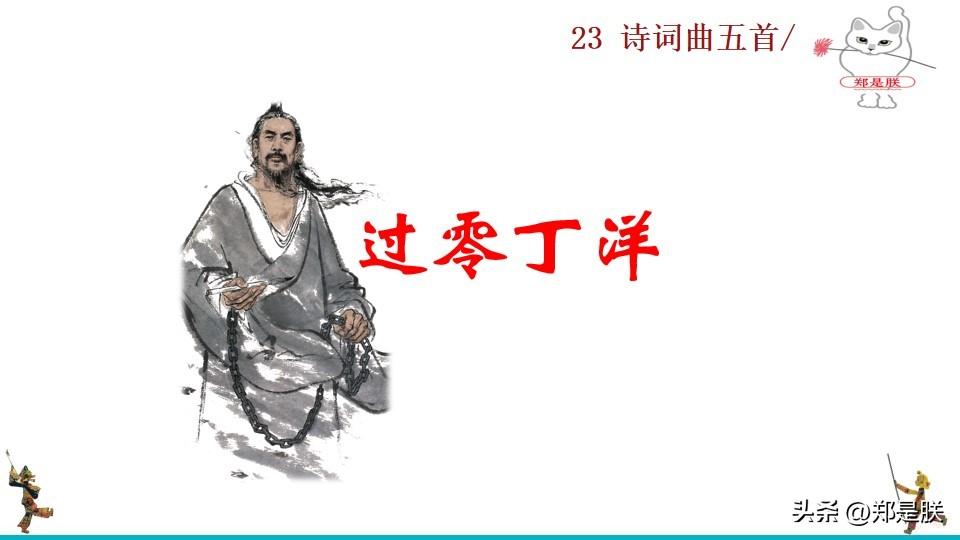
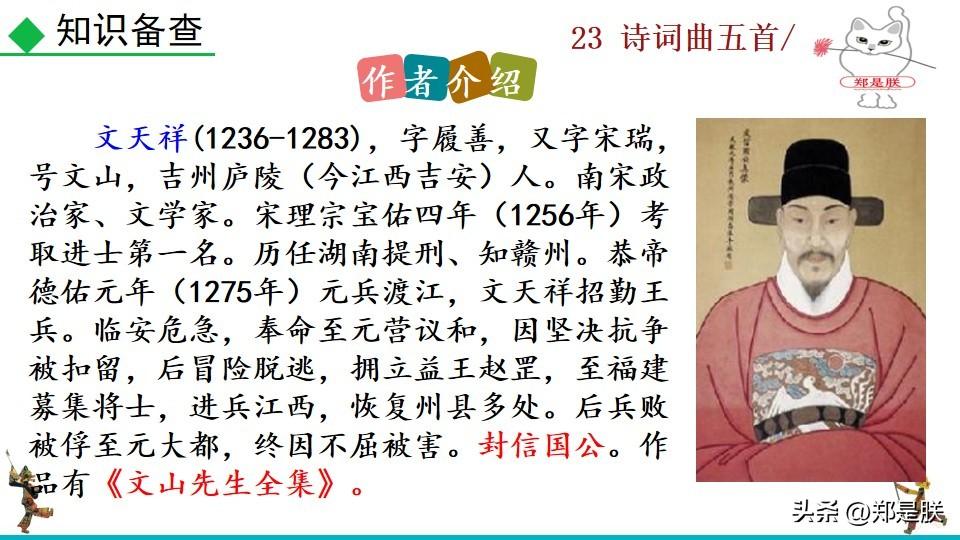
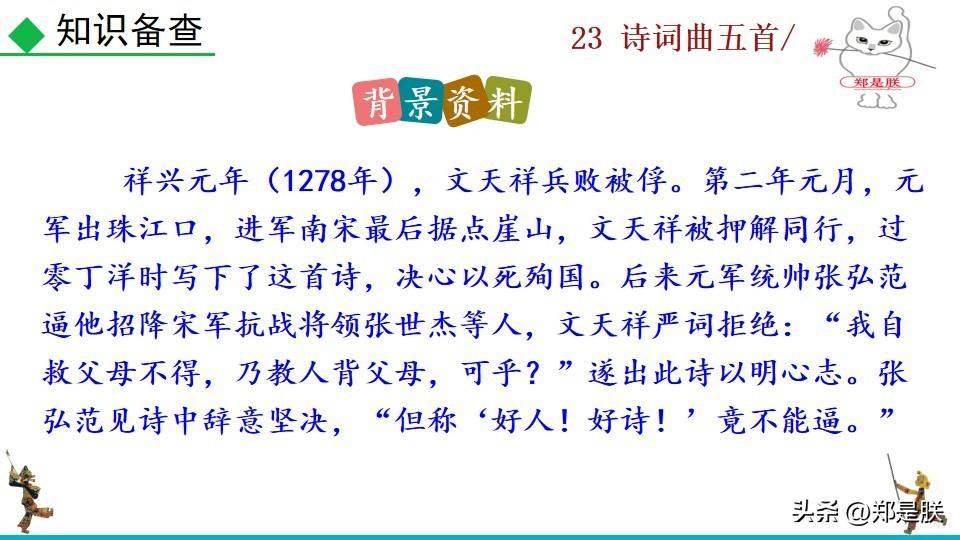
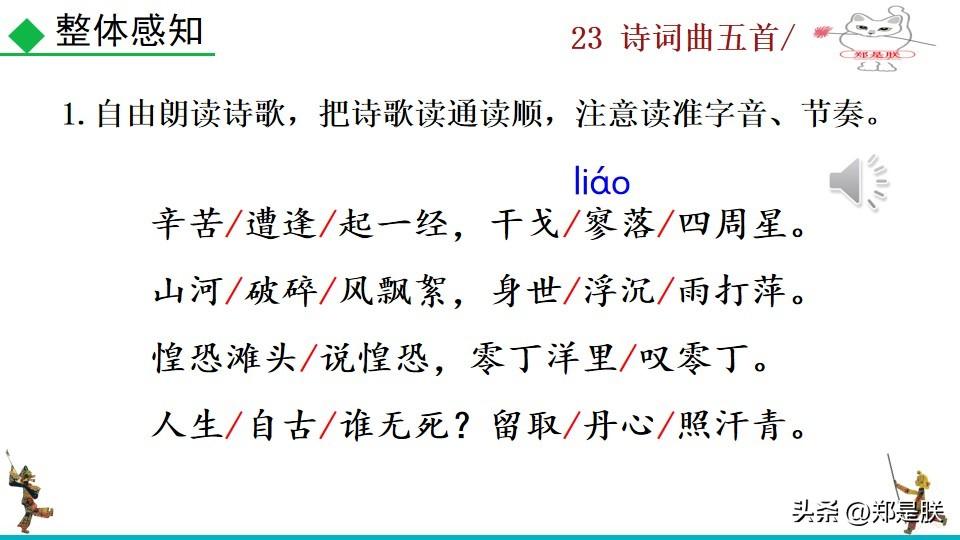

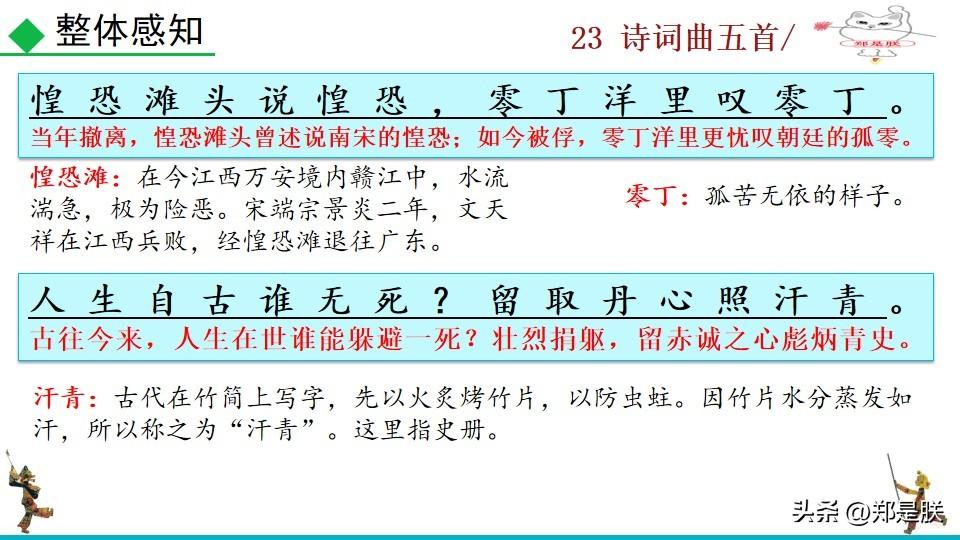
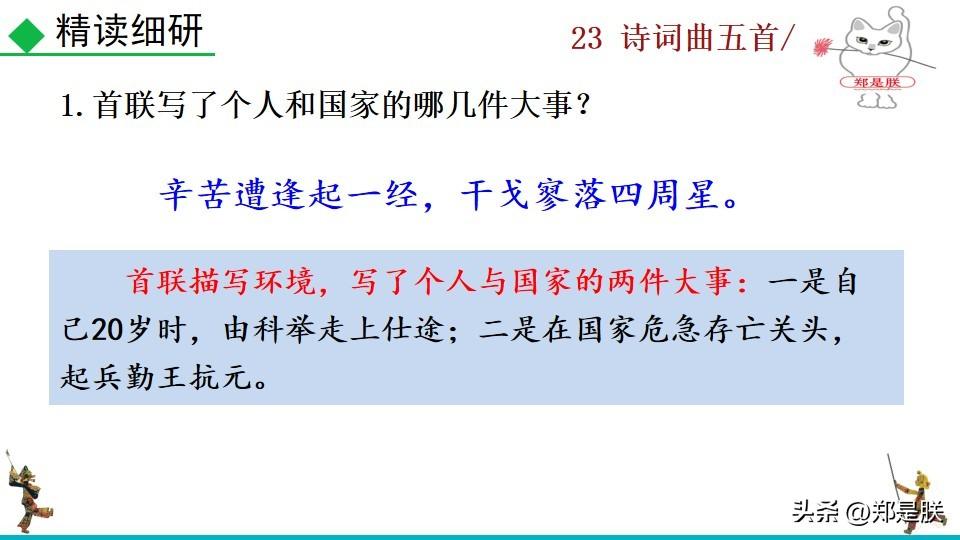
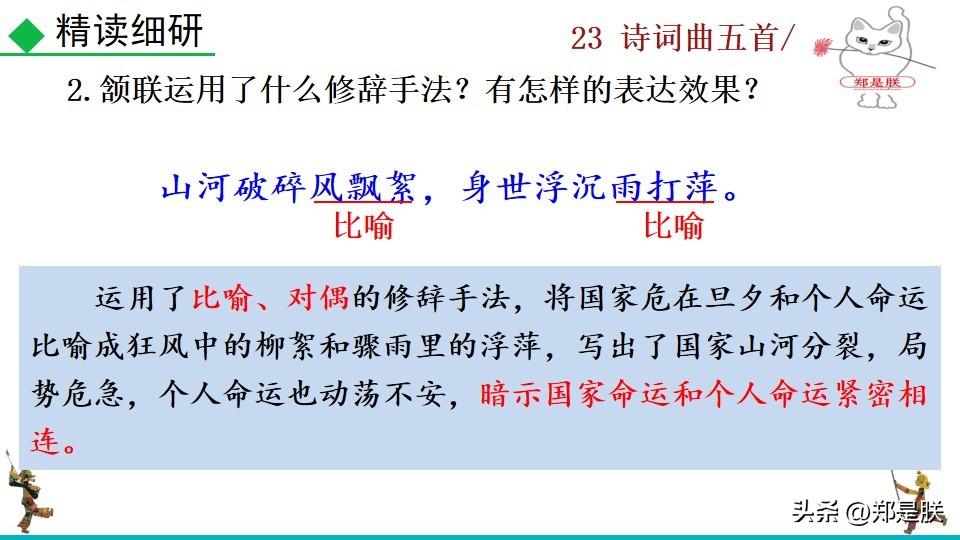
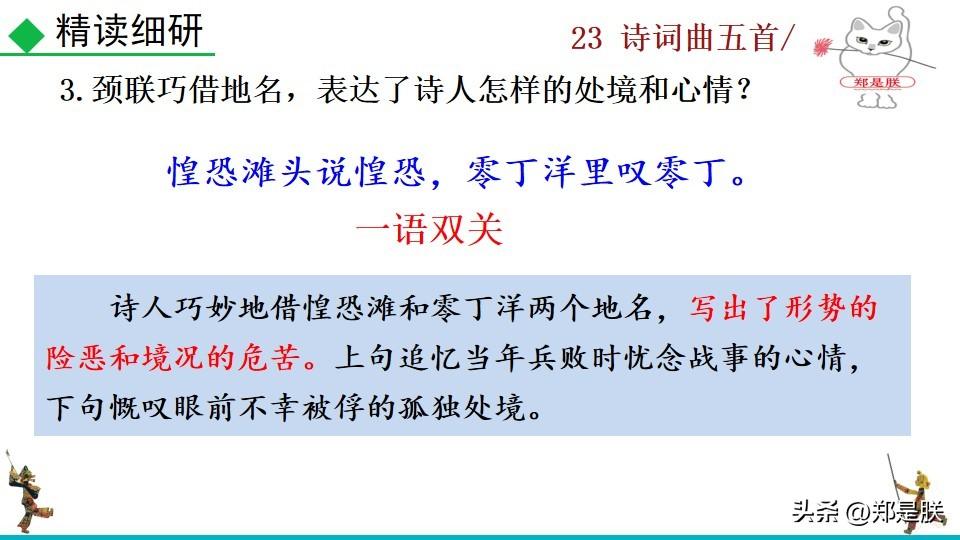
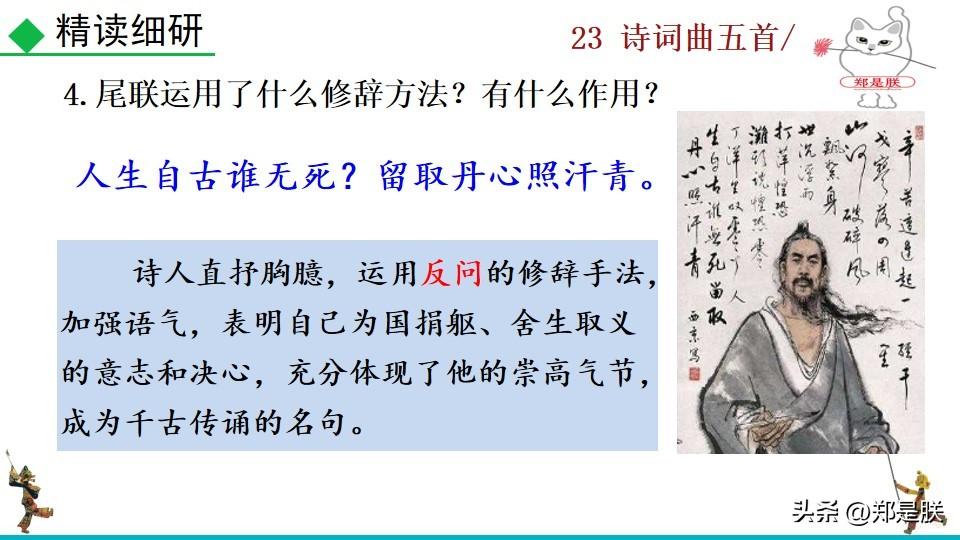

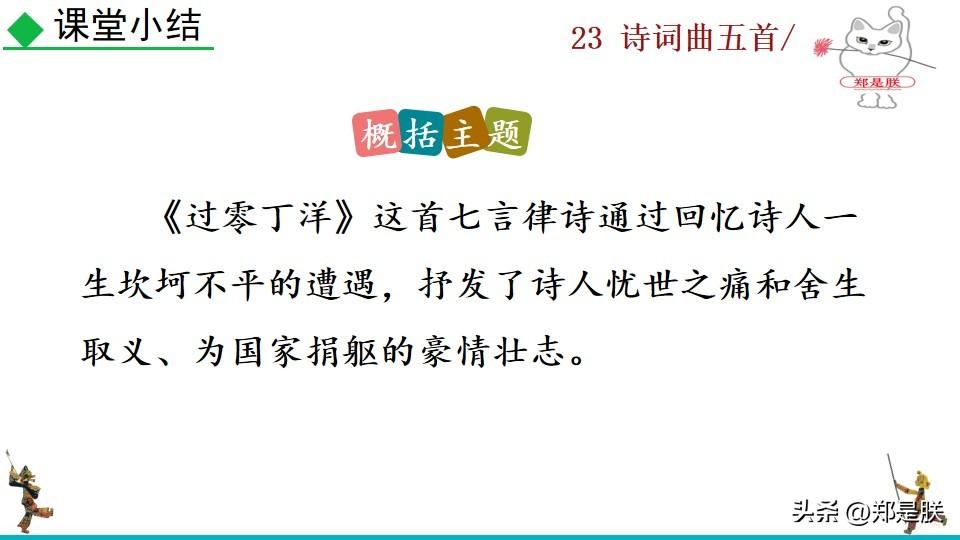
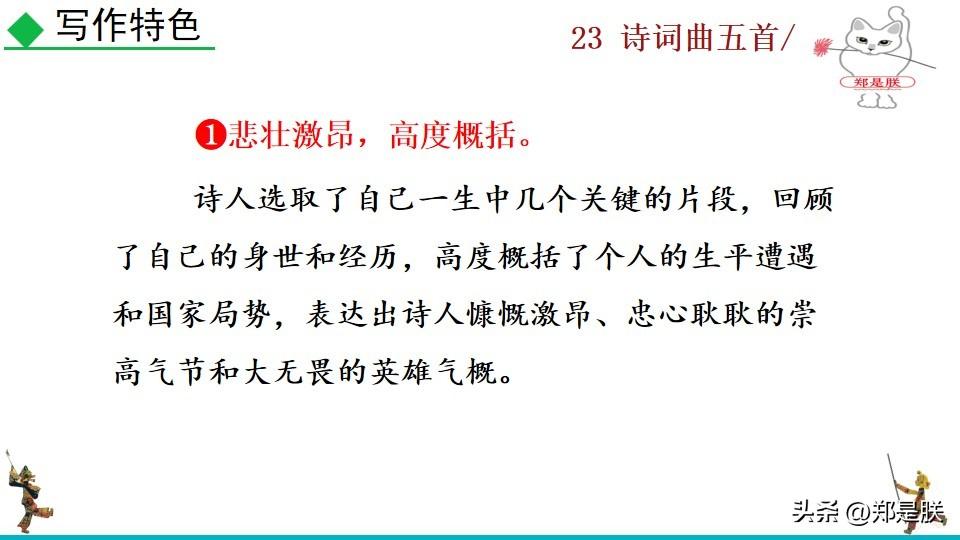
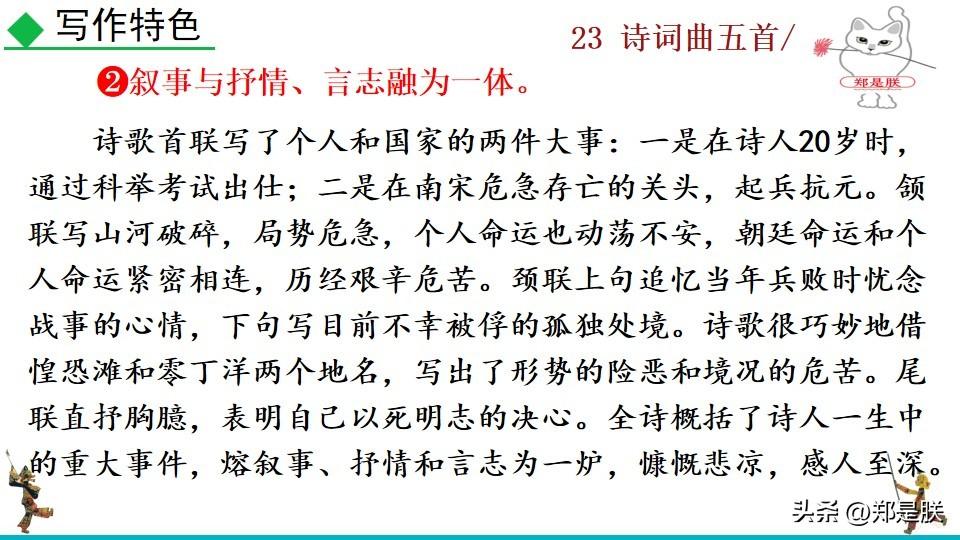
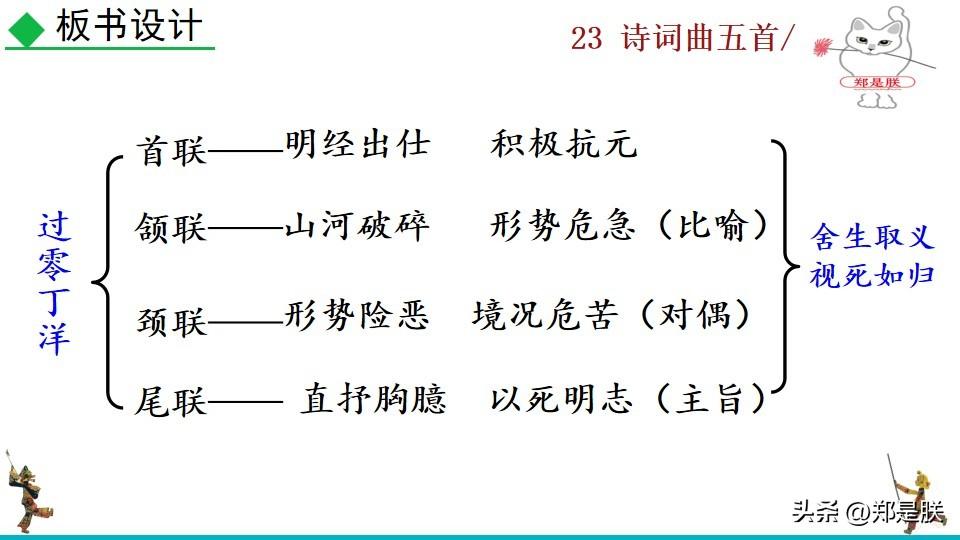
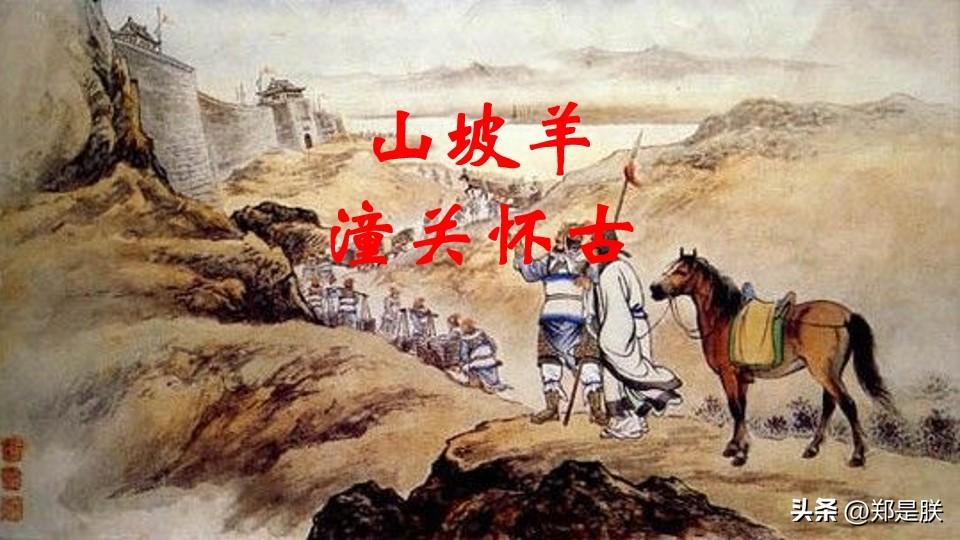
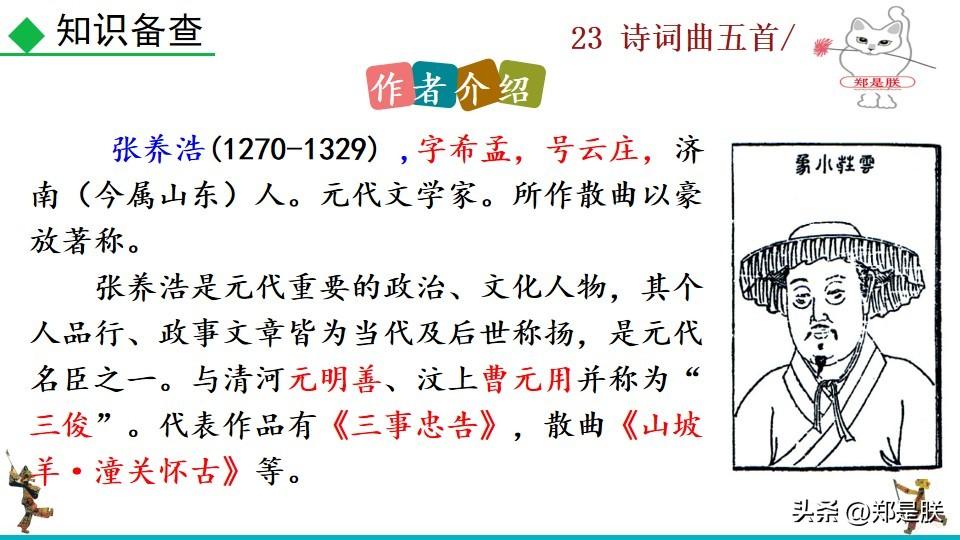
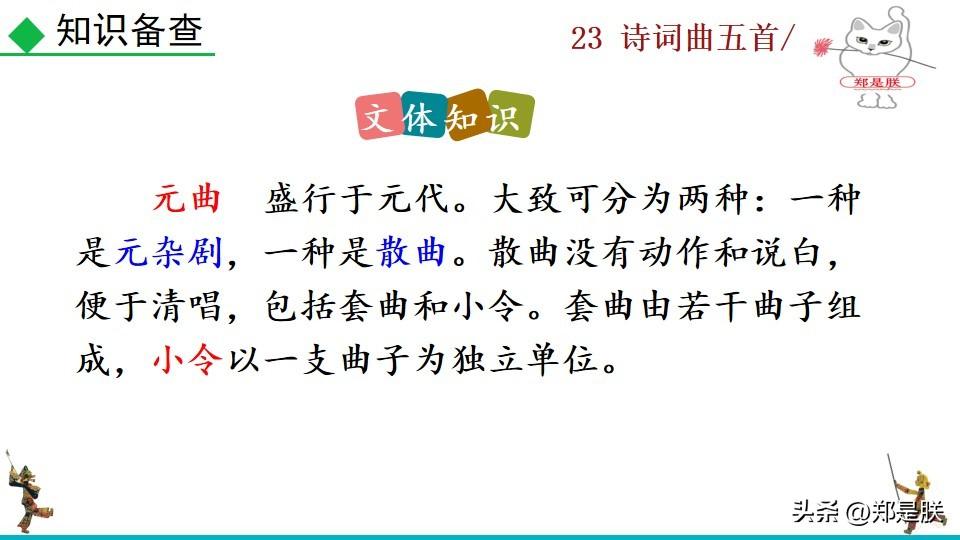
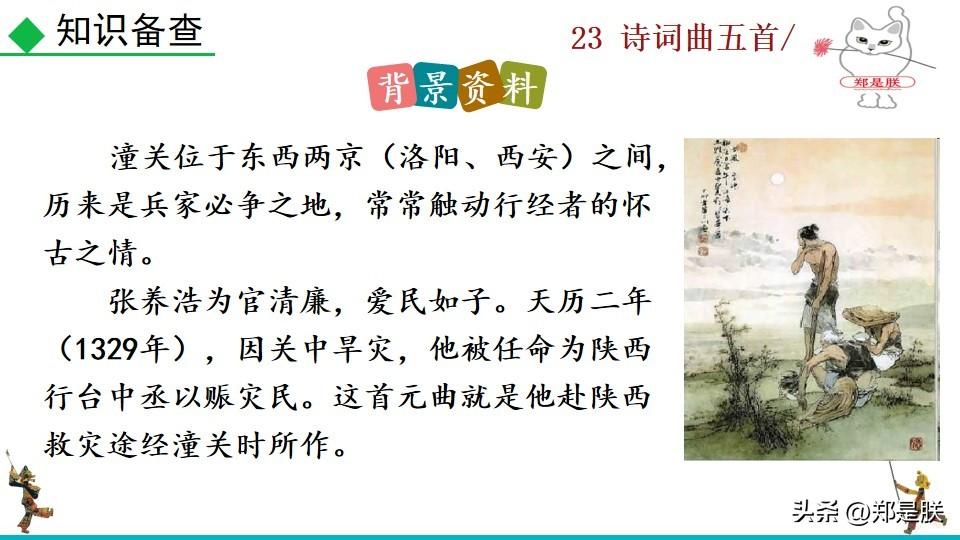
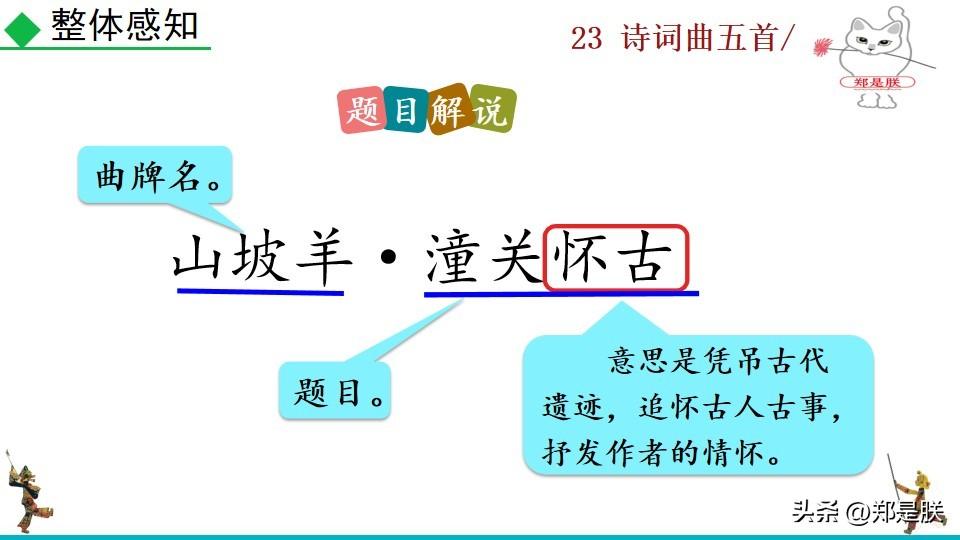

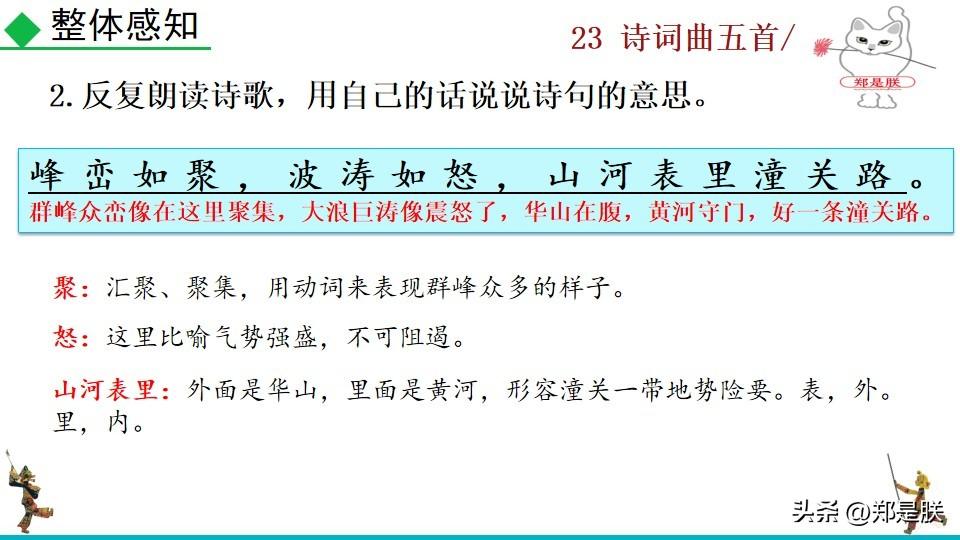
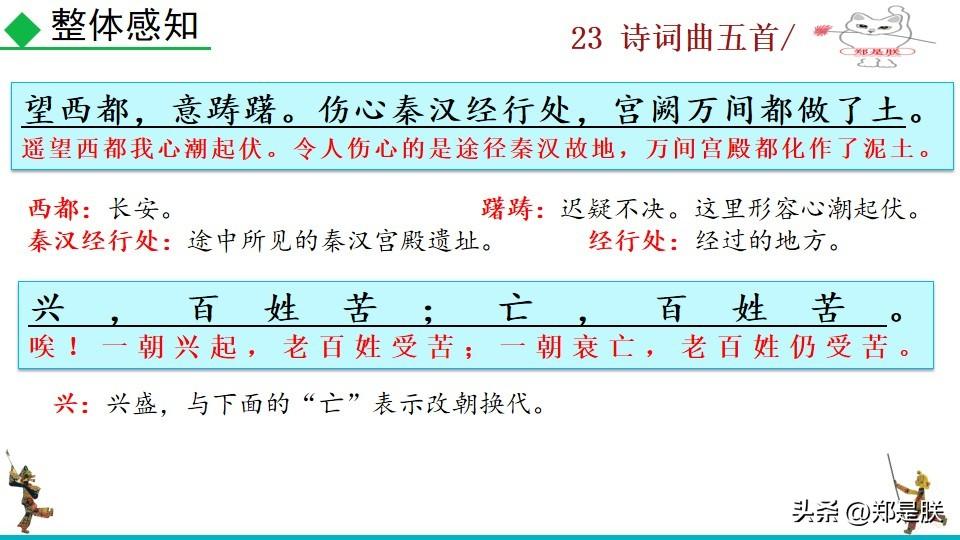
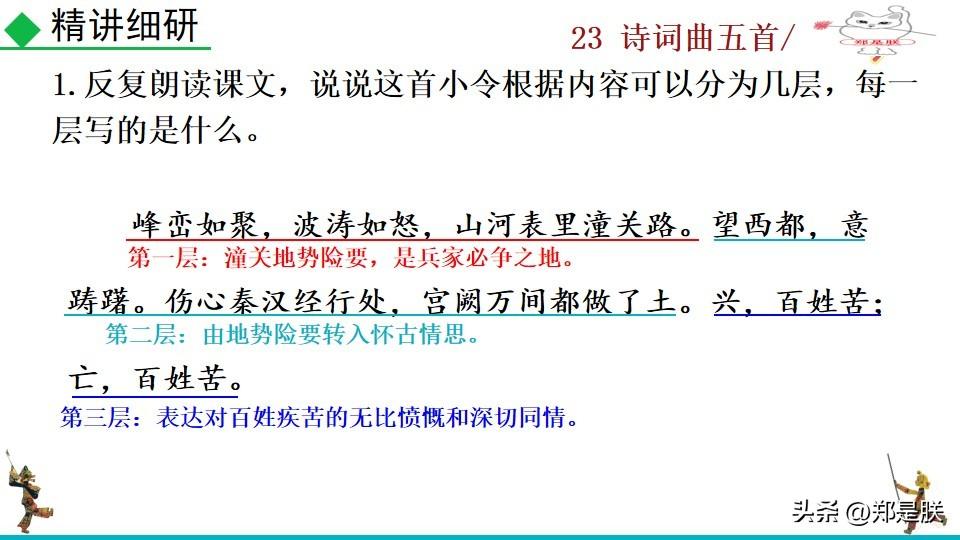
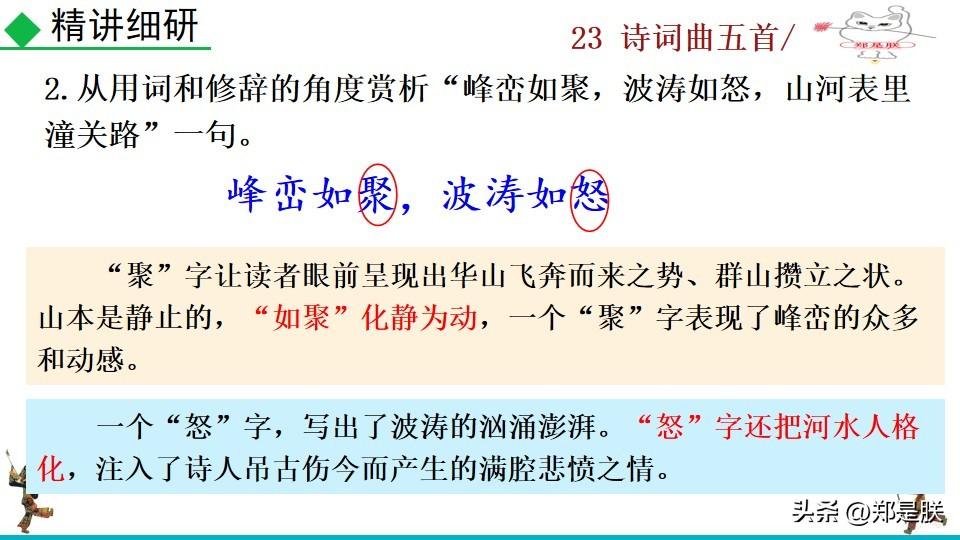
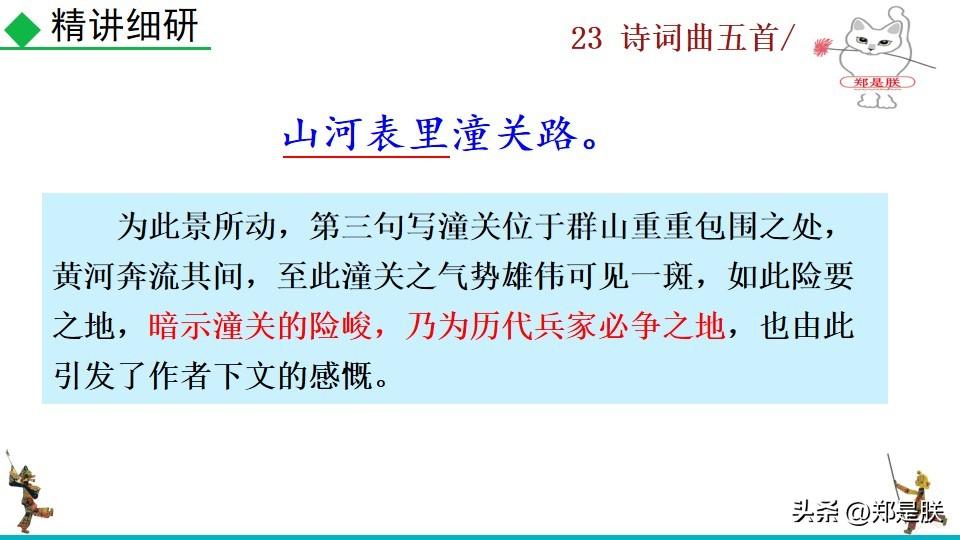
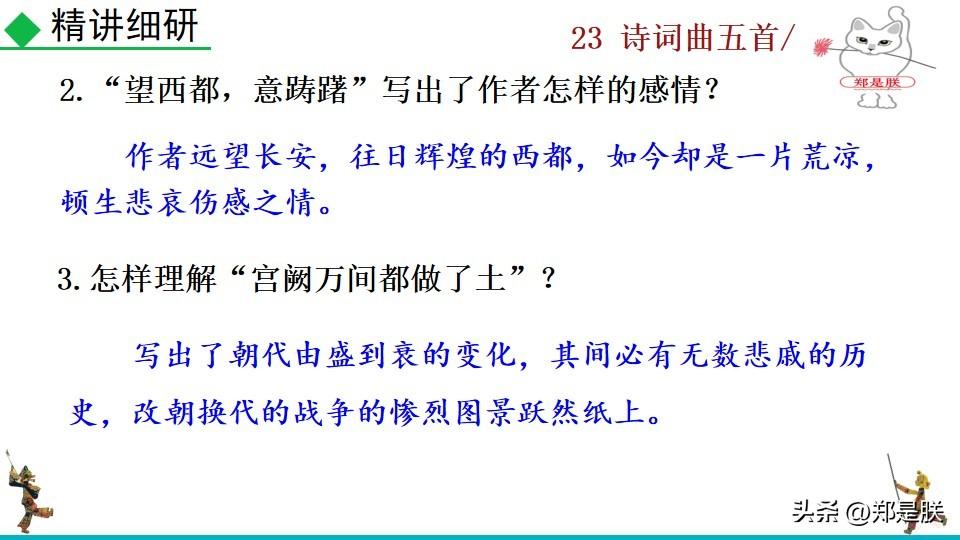
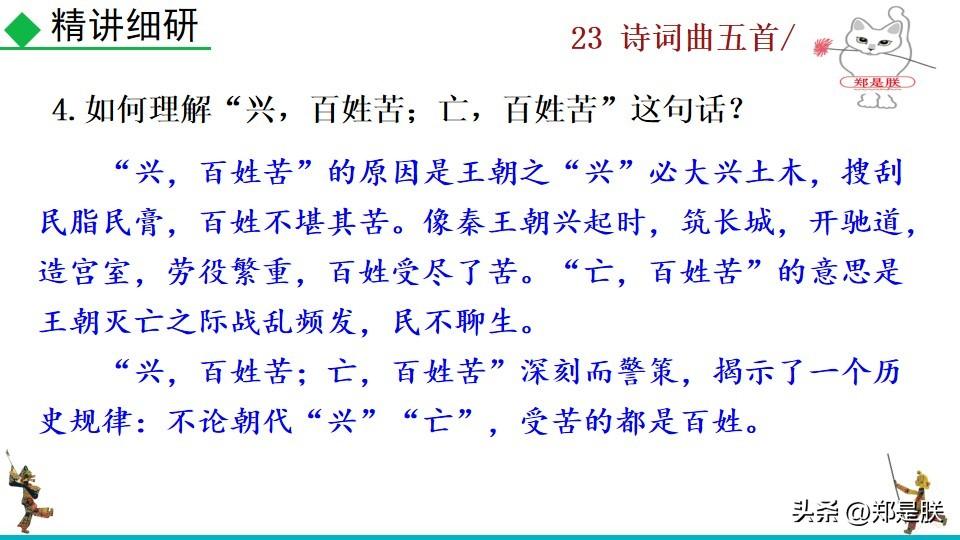
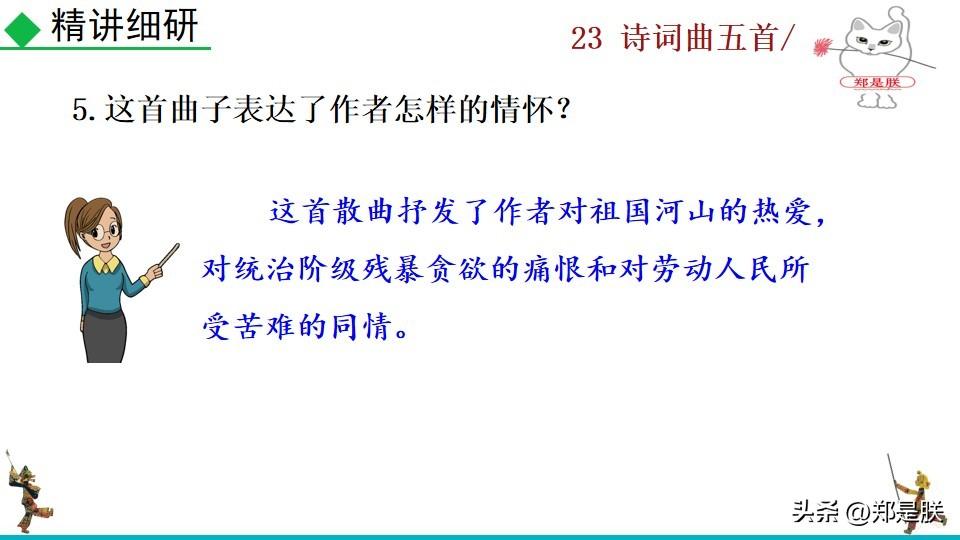
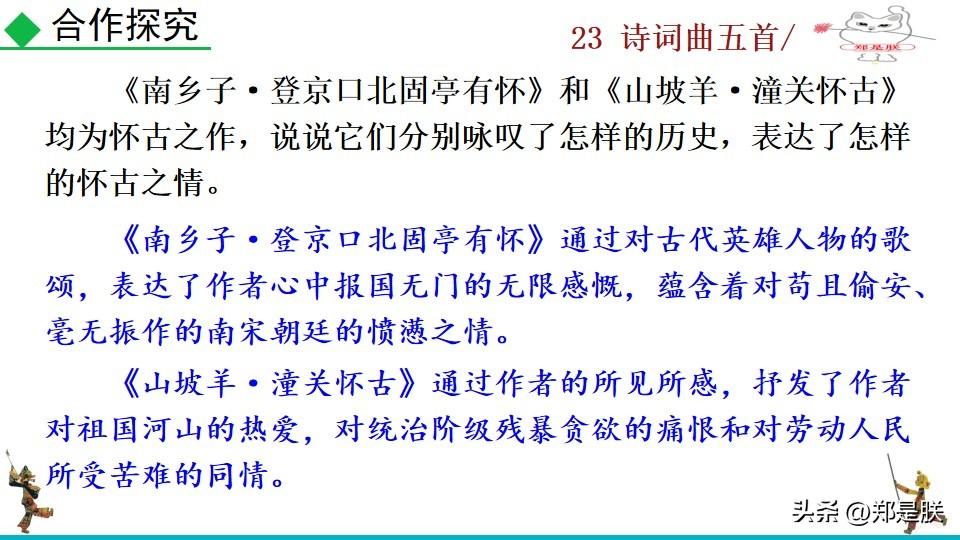
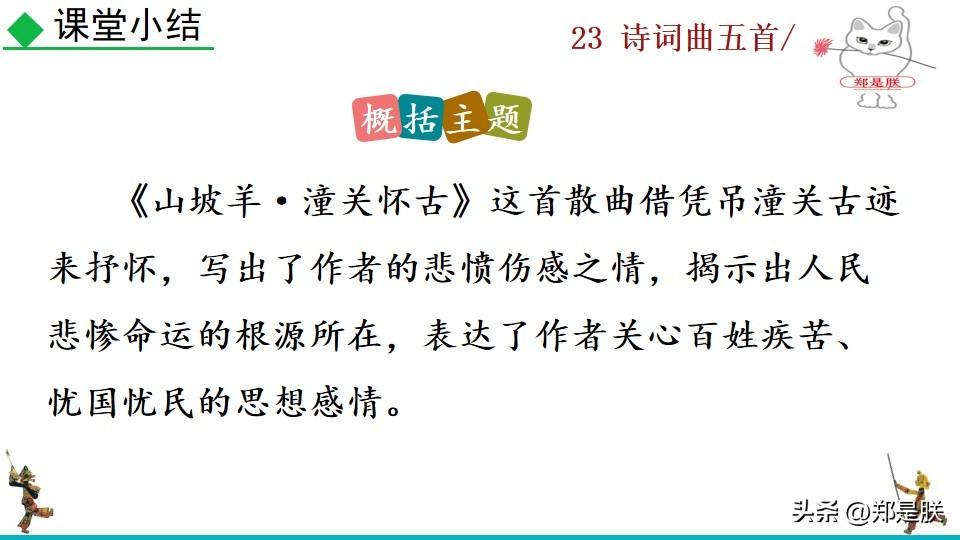
Articles are uploaded by users and are for non-commercial browsing only. Posted by: Lomu, please indicate the source: https://www.daogebangong.com/en/articles/detail/Nine%20Languages%20Lesson%2024%20Five%20Poems%20and%20Songs%20original%20text%20%20reading%20%20knowledge%20points%20%20courseware%20%20exercises.html

 支付宝扫一扫
支付宝扫一扫 
评论列表(196条)
测试